Ethos Logos Partners – Classical Education Platform
For the past few years, I’ve been leading a team that is building out an educational model that will change the country. Big statement, big goal, and timing are now. We are at a pivotal inflection point in history, a Gutenberg moment. In a similar time and occurrence to the pre-Renaissance dark ages, information availability is exploding and our kids need tools to make sense of what is truth.
Imagine how difficult it is for a young adult to determine:
What’s GOOD?
What’s TRUE?
What’s BEAUTIFUL?
Being able to discern between the noise of the day and what is TRUE takes years of foundational education, rooted in history, with a focus on values and virtues. This education starts in the home and is reinforced in the classroom.
Education in America has turned into a collection of learning facts without context and a hyper-focus on the narrow ability of a student to pass a standardized test. We need a nation of deep thinkers with the ability to discern right and wrong. Scholars that understand their duty in a republic.
If we engage the scholar’s interest and excitement around learning, then we set them up on a life of opportunities, responsibilities, and deep thinking, and a hunger for learning.
This effort that you are about to read is my way of entering the arena and making a difference.
Our History In Classical Education
The idea for a school system started to take root in 2014. Since then, I have been a part of a team that opened a group of charter schools in Arizona and Colorado. We opened our first campus in 2015 in Marana, Arizona with an academic model is based on the Classical Education/Charolette Mason program of instruction. I served as CEO and our team grew the network to 7 campuses, with two or three campus openings per year. In the 2021-2022 school year, we have 6000 scholars in a PreK to 8th-grade model. In opening and operating these schools, it became critical that we have a common platform to run each campus to its highest standards. My background was in multi-state operations so I immediately began to systematize all aspects of our schools. Our goal was rapid expansion so I embarked on building out each part of a school’s operation so we weren’t recreating the wheel with each new school.
on the Classical Education/Charolette Mason program of instruction. I served as CEO and our team grew the network to 7 campuses, with two or three campus openings per year. In the 2021-2022 school year, we have 6000 scholars in a PreK to 8th-grade model. In opening and operating these schools, it became critical that we have a common platform to run each campus to its highest standards. My background was in multi-state operations so I immediately began to systematize all aspects of our schools. Our goal was rapid expansion so I embarked on building out each part of a school’s operation so we weren’t recreating the wheel with each new school.
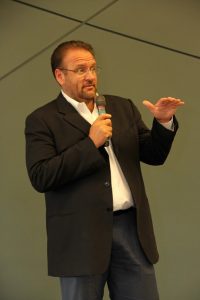 The systems required to run a complex public charter school have been refined and packaged into a business model. This model looks to expand the Classical Education platform to other charter schools, as well as to the growing home school community. The long-term goal is to eventually the public school arena with a researched back curriculum offering that addresses character education and is based on history instruction, stories of great men and women from history and a focused effort on values and virtues.
The systems required to run a complex public charter school have been refined and packaged into a business model. This model looks to expand the Classical Education platform to other charter schools, as well as to the growing home school community. The long-term goal is to eventually the public school arena with a researched back curriculum offering that addresses character education and is based on history instruction, stories of great men and women from history and a focused effort on values and virtues.
The systems we have built out include checks and balances, training protocols, culture builders, curriculum plans, charter drafting support, regulatory compliance, and assistance in site location, development, and financing of the projects. All these aspects of running a successful Classical Education charter school have now been bundled together under the company umbrella, Ethos Logos Partners.
curriculum plans, charter drafting support, regulatory compliance, and assistance in site location, development, and financing of the projects. All these aspects of running a successful Classical Education charter school have now been bundled together under the company umbrella, Ethos Logos Partners.
Ethos Logos Partners
Ethos Logos Partners is the parent company and it has five areas of focus. These include:
1. Charter Writing – Development – Funding.
Our role in this domain is in helping with the drafting, consulting with non-profit governing boards, and navigating the state-by-state regulatory environment in charter school-friendly states. This domain includes funding and development of the school campuses if needed.
2. Classical Curriculum – K12.
Our team has designed, perfected, and deployed a PreK to 12th grade Classical based curriculum. Under the brand, Medici Classical – Program of Instruction, we are deploying this curriculum not only to our future schools but to the fast-growing home school market. The offering will include printed cards, workbooks, digital day-by-day roadmaps, and an opportunity for top teachers to set up micro-stores within our platform. (More about Classical Curriculum – VIDEO)
3. Character Education – 10 Point Plan.
The secret ingredient in our school’s success and why the Classical Education model appeals to so many families is the integration of value and virtue instruction into every aspect of the K12 experience. We have deployed a Character Education-based platform that dovetails into our Classical curriculum or which can stand alone. This stand-alone model is ideal for public schools. Our team would implement history-based courses with a focus on values and virtues and the great men and women from history that help serves as a guide to our scholars of what could be.
I completed my master’s program with a focus on Character Education. From my first-hand experiences and combing through 20+ years of research, I’ve been able to put together a research-backed, 10 point plan, to implement a character education platform in public schools. I wrote a book on the topic which functions as historical background and a road map to the 10 Point Plan. This stand-alone program can easily fit into any public school in the U.S. under the Social Studies class offering. (Character Education VIDEO)
4. Teacher Training.
The key to our success is finding, training, and building the professional skills of the teachers in our system. Bond offerings pointed to the fact that our network had 89-91% teacher retention rates while doubling in size each year. That success translated into the success of our schools both academically and culturally. We have school launch trainings, hiring supports, professional growth plans, and a robust oversight and reporting back end that helps our teachers to be the best they can be in the Classical Education model. (Teacher Training – VIDEO)
5. School Operations.
Operating a public school is a complex endeavor. Over our years of operation, we’ve developed a complete operational process with covers every aspect of operating a public school. These manuals include implementation, training, and monitoring of the following areas: Legal aspects of American education, special education operations, intervention, and academic oversight, after school programs, lunch and front desk management, nurses office forms and tracking, Principal/Vice-Principal training, and support, facilities maintenance and much more. (More on school operations – VIDEO)
We are slated to open in rapidly growing Tampa Florida and have teams in Nevada, Georgia, Minnesota, and Texas pursuing charter school contracts. We are launching our beta version of the home school curriculum, both print and digital, in January 2022. The full, national rollout, will occur during the summer of 2022.
Below are some of the aspects of the above, FIVE parts of the Ethos Logos Partners company.
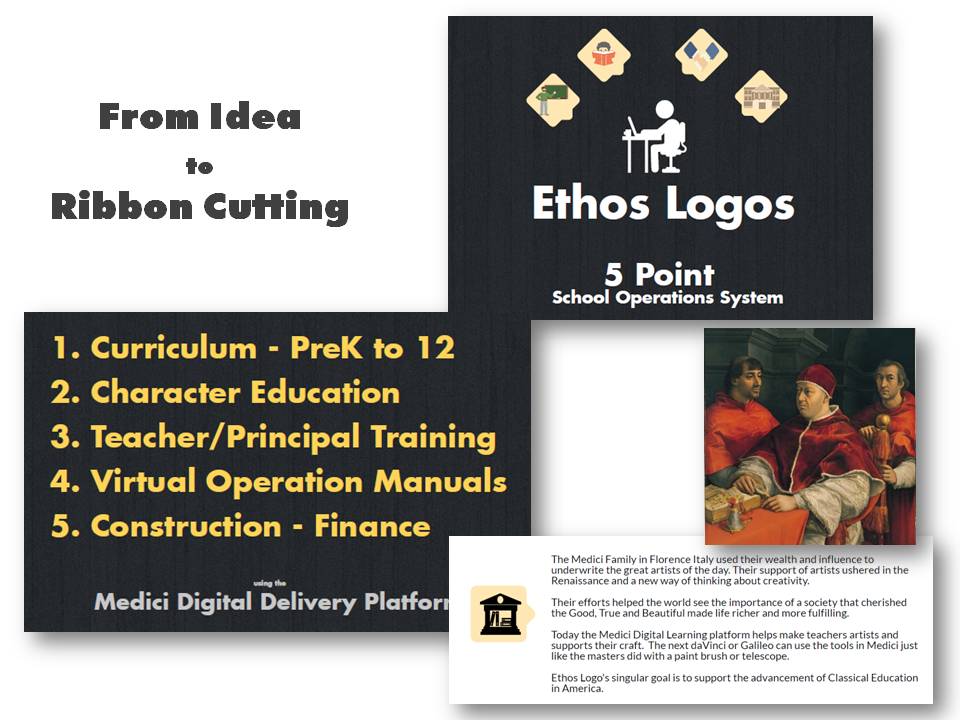
Classical Curriculum for K-12
Classroom and Home Schooling
Every Subject – Month By Month – Day By Day Instruction
English, Math, Science, Art/Music, Latin Logic, Rhetoric
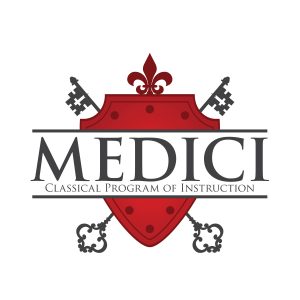 Beginning in 2020 we are going to deploy a home school classical educational product that helps parents implement the benefits of Classical education in their homes. The Medici Classical brand will be the home-facing offerings of our curriculum. The parent offerings will include easy-to-follow print and day-by-day digital resources. The political climate in schools has seen an explosion in homeschooling families with the homeschool market growing from 3% to 11% of the population in the past 5 years. Medici will help these families teach at home with confidence and supports.
Beginning in 2020 we are going to deploy a home school classical educational product that helps parents implement the benefits of Classical education in their homes. The Medici Classical brand will be the home-facing offerings of our curriculum. The parent offerings will include easy-to-follow print and day-by-day digital resources. The political climate in schools has seen an explosion in homeschooling families with the homeschool market growing from 3% to 11% of the population in the past 5 years. Medici will help these families teach at home with confidence and supports.
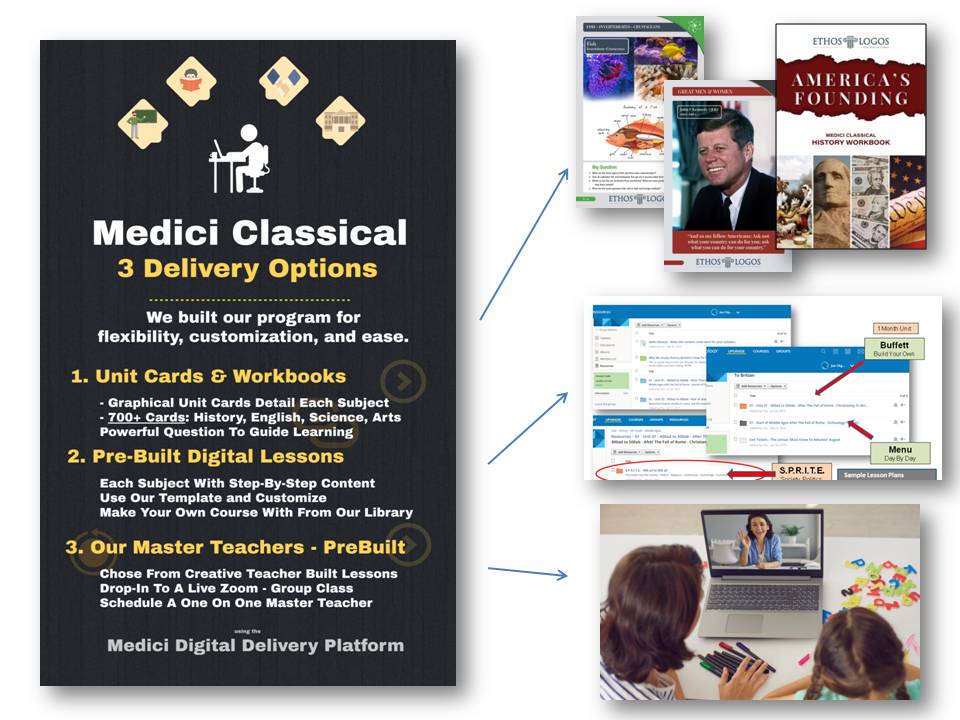
Medici Classical Curriculum Is Different
Built For Classroom Teachers – And Homeschool Families
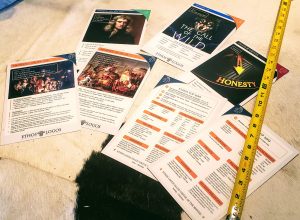 We have also built the Medici Classical Curriculum with the classroom teacher in mind. We found that teachers were spending far too much time digging and creating content to meet the fast-paced day so we embarked on a plan to put resources at the fingertips of every teacher in our schools at the very moment that they may need it. Our mantra was to let us focus on the WHAT to teach and allow you to focus on the HOW. In building our charter school network we listened to teachers and Principals and designed our curriculum around what they told us. As you continue to go deeper and deeper into
We have also built the Medici Classical Curriculum with the classroom teacher in mind. We found that teachers were spending far too much time digging and creating content to meet the fast-paced day so we embarked on a plan to put resources at the fingertips of every teacher in our schools at the very moment that they may need it. Our mantra was to let us focus on the WHAT to teach and allow you to focus on the HOW. In building our charter school network we listened to teachers and Principals and designed our curriculum around what they told us. As you continue to go deeper and deeper into
our print and digital platforms you will find that there is almost too much cover. We tell our teachers and we suggest to our homeschool families, don’t get lost, get familiar with the tools we provide and spend your efforts on connecting with your scholars. Quickly, you’ll find that your students tell you exactly what they want to cover. (How Our Curriculum Cards Work – VIDEO)
The Beginning of Curriculum Cards
I asked parents what they noticed different about our schools and the answers I got back was that the dinner table conversations were like nothing their family had experienced before. Their kids were excited to share the history stories they’ve learned in school. From that feedback, I started to create curriculum cards as a way that parents could follow along and prompt questions as conversation starters.
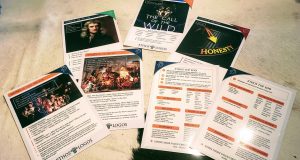
These cards are based on one month of one subject. Typically, the concepts covered for the month are laid out in bullet format with big general themes which the teacher can pull from. For our kids with short attention spans brought on by too much screen time, these cards are designed to pique their interest and to encourage them to want to dig into new concepts and ideas on their own. Each card has far too much to cover in the classroom, but they provide a roadmap for a student to dig deeper should they find a topic interesting.
From the kernel of an idea as a way to bring the family into their child’s educational experience came a series of curriculum cards that has grown to over 800 laminated cards representing a month of each subject scholars will cover. We color code the upper corner by subject and code each card for the year and month that the subject should be covered. This easy, overarching snapshot of a month’s worth of content becomes the foundation from which all our offerings are delivered. Simply line up the date codes, sort by color codes, and then explore.
Sample One Month Unit
Below is a sample of a monthly unit using the Ethos Logos Curriculum Card platform. The sample unit is the Rennaissance and in our thematic model, history is the anchor. These cards are designed for our classroom teacher or home school families to review and connect in ways that match their scholar’s interest or their family’s beliefs and focus. Curriculum cards also come with workbooks full of leveled questions that can be used to construct lessons around, prompt further research or build large projects around. The workbooks also include sample worksheets and suggestions of ways to make a particular card come alive. With these cards, a scholar can explore, dig deeper and make connections that are only limited by their imagination. We call these one-month units and there are 10 monthly units in a class grade. That is only our suggestion and you can continue along as long as you would like. This depth of history and interconnections of subjects, student-centered learning, focus on values/virtues as well as artists and musicians is very much Classical and Charolette Mason influenced instruction. Combine all this with our day-by-day digital instructional platform and, as we tell our classroom teachers, we’ll help you focus on the ‘WHAT’ to teach and allow you to focus on the ‘HOW’ to make a lasting impact.
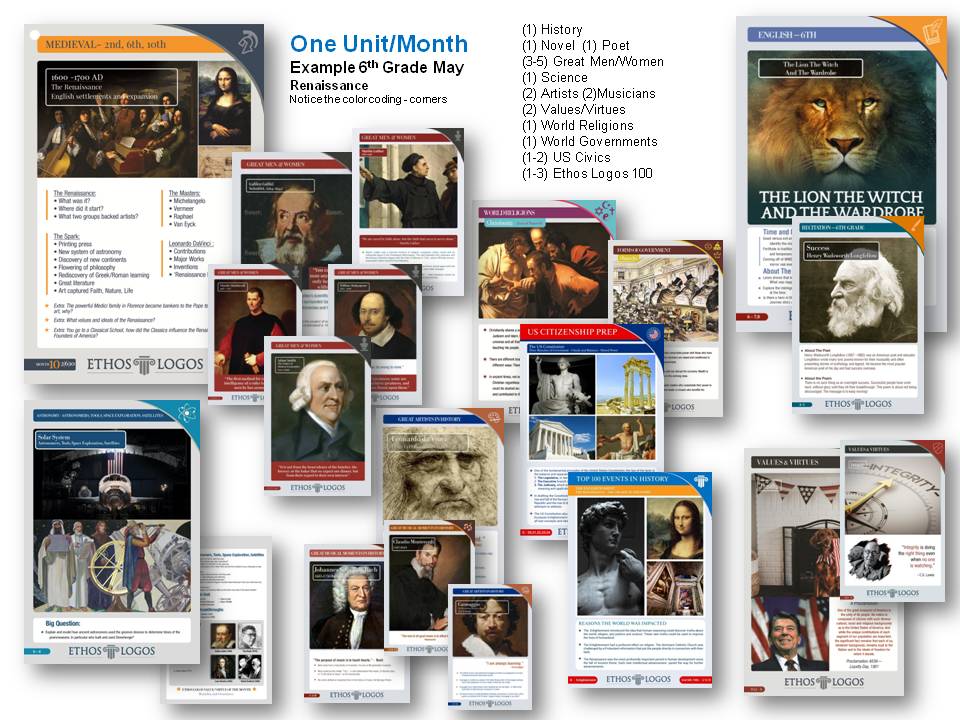
Question Bank – Workbooks
Along with the curriculum cards, we provide a workbook full of questions. No answers, just questions. In keeping with the Socratic concept of questioning, we find that the power in learning something is asking the right questions. Our classroom teachers or homeschool families can scan the bank of questions and determine what interests them or which questions align with their family’s values system. We group the various questions by suggested grade band but parents at home can move up or downgrades based on their child’s ability.
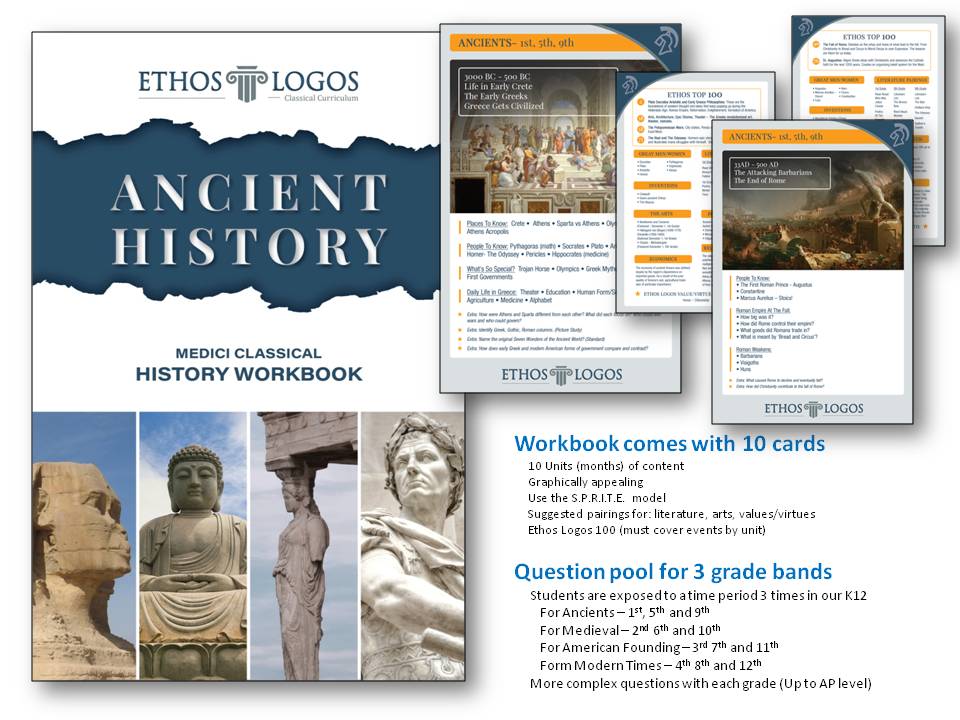
Digital Resources
To complement the cards and question bank, we have also built out a digital classroom with suggested ways to deliver particular subjects in a clear, day-by-day format. A homeschool family or classroom teacher can teach from the cards on their own, add in powerful questions we’ve curated on each topic, or log in to our digital tool and have content delivered in a format that walks from start to finish each monthly unit. These digital units were built by classroom teachers and our team and took years to compile. We’ve built each month’s content out as we suggest but the parent at home and the teacher in the classroom also has hindered of resources for each unit to supplement, add to, or expand upon if they or their scholars are interested. (Digital Resources Curriculum Resource Introduction – VIDEO and Digital Resources A Tour – VIDEO)

History Is The Starting Point

In Classical Education, we build our instructional model of time periods in history. Scholars in a particular grade, say 6th grade, are covering the time from the Fall of Rome to the Age of Exploration. Each month they study a new time period. The history they cover in the classroom is aligned to the artists, musicians, historic novels, scientific advancements of the particular period. We find that this emersion into a period of history helps to anchor concepts and make connections
across subjects that allow for deeper understanding. In addition to studying a particular time period per grade, in the Kinder – 12th-grade Classical model, the scholar will see the particular time period a total of 3 times. Each time they dig into a historical moment in human history, they are going deeper and deeper into the nuances of then and how it applies to now. (What is Classical Education? VIDEO)
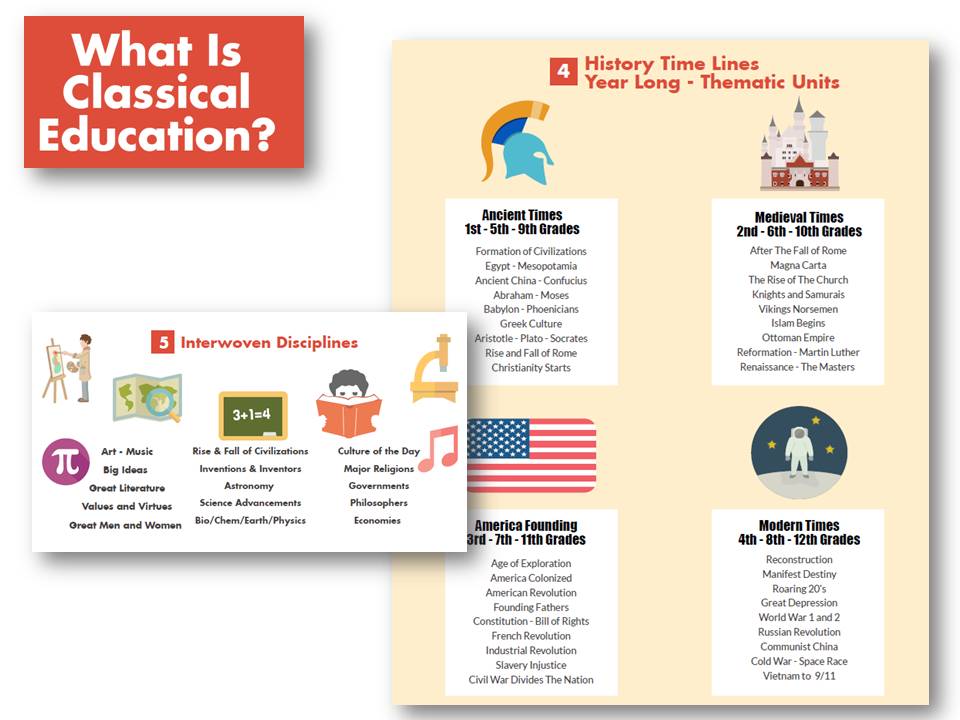
The Ethos Logos – Card Curriculum – Platform
800+ Cards Fit Together In Hundreds of Ways
The Medici Classical Curriculum was developed by experienced classroom teachers, home school teachers, and experts from private Christian Classical schools as well as public education curriculum designers. We are the first group to build a full Pre-K 12 classical curriculum for use and adaptation in the private, public, and home school arena. Our team has opened and managed award-winning Classical Education charter schools in multiple states. The Medici Classical Curriculum is a multi-year effort to organize, test, perfect, and layout a framework where parents and teachers can successfully take advantage of the classical model. (History – Logic and Rhetoric – VIDEO) 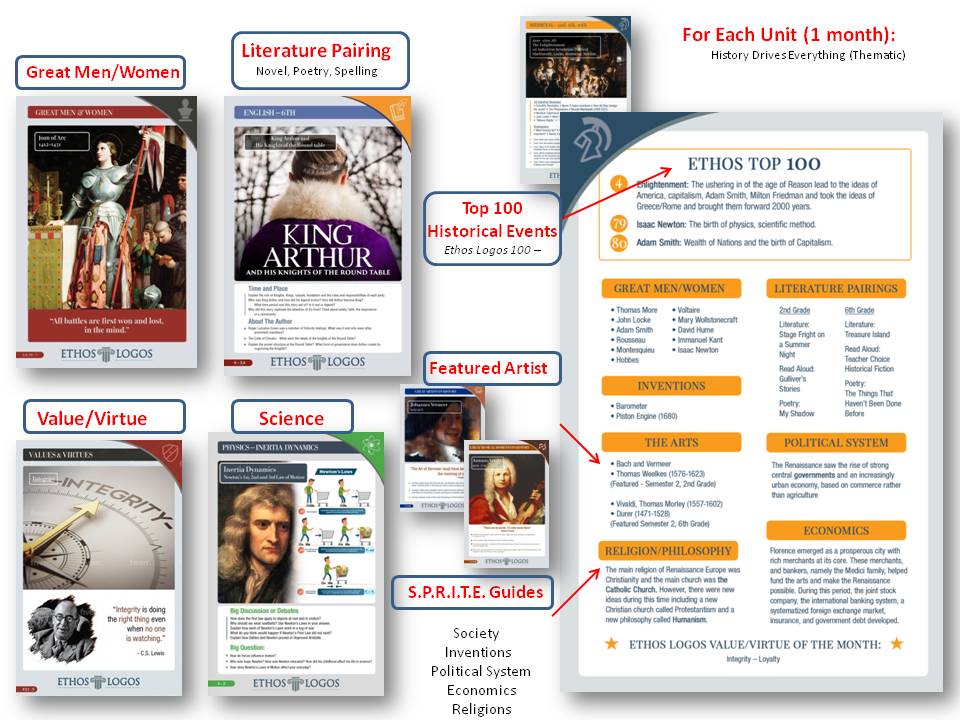
Ethos Logos Top 100
Since history is paramount in our Classical model. Our team put together the Top 100 Events in human history. The Ethos Logos Top 100 appear at various months/units throughout each grade. We provide a clear road map with each history unit and allow for our teachers and home school parents to match their interests and instruction to what the scholars are excited about. The Ethos Logos 100 are topics that we highly recommend that when planning their instruction our teachers make sure to cover these monumental events. In addition to our monthly history instructional cards, we’ve built out 100 cards that go a bit deeper into the WHY and WHEN one of these history-changing events happens. Here is a sample of the Ethos Logos 100 and how they apply in our instructional model.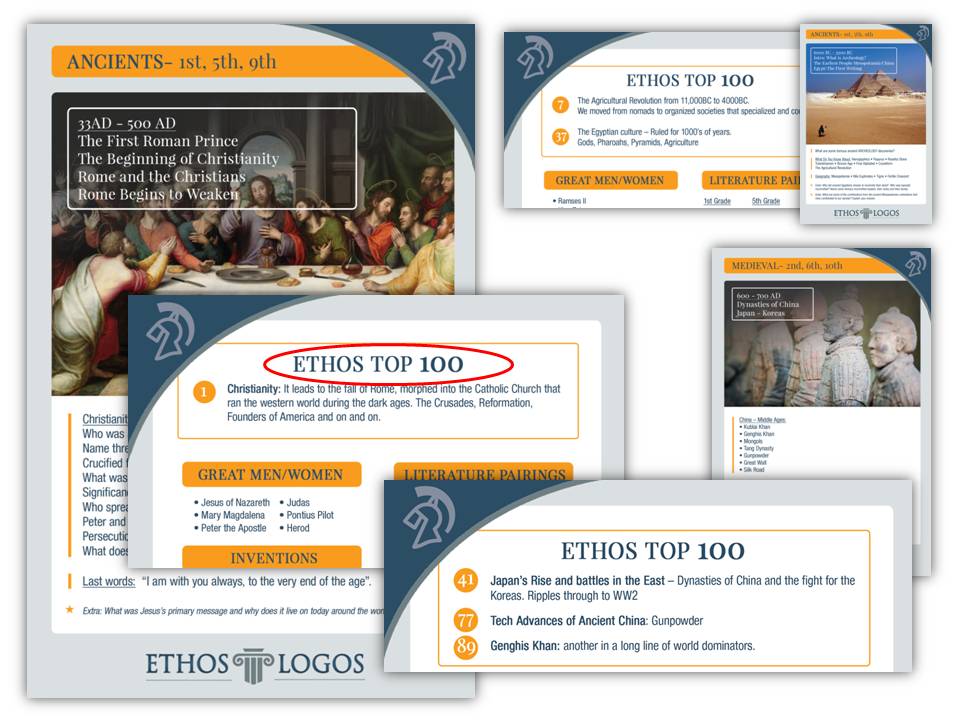
Creativity and Immersion Into History
The interconnection of subjects helps scholars connect all the dots and understand how the past relates to today.
Our history offerings found in our curriculum mapping are built out using National Social Studies Standards plus the S.P.R.I.T.E. Model. Under this buffet of curriculum resources, the teacher can choose one or more aspects of a particular month-long unit. The flexibility for the teacher to focus on the SOCIETY (what it was like for children, nobility, or others in a time period), POLITICS (how the civilization was governed and ruled), RELIGION (what doctrine a community followed, when the great religions started and how they impacted society), INTELLECTUAL (what were the great ideas, the impacts of art, architecture, and music), TECHNOLOGY (what advancements came into existence and how these changes impacted history), ECONOMY (how did the society trade, build, grow or make the goods and services they needed). The S.P.R.I.T.E. Model of history lesson planning allows the teacher to match their interest with their student’s curiosity to deliver impactful lessons.
I have seen some of our 6th-grade teachers dress in Knights and Queens costumes to welcome the students in for a week of Medieval Games. With our Charlotte Mason influences, we encourage creativity because long after a scholar leaves the 6th grade, they may forget the Pythagorean Theorem but they will remember their teacher hosting the feast of the round table. (History Instruction – Curriculum VIDEO)
US Citizenship – US Civics
Did you know that only 62% of Americans born and educated in the USA pass the 130 questions US Citizenship test?
Foreign-born people looking to naturalize into the US pass at 97.5%. To us, that doesn’t make sense. If our kids aren’t leaving school with the basics of what it means to be an American, then someone isn’t doing their job.
The US Citizenship Test is a 100 question exam covering how America was formed, our tri-cameral distribution of power, and some of the local nuances of who your state Senators currently are. In our schools, we start in 5th grade with 20 questions taken directly from the US Citizen exam. By 8th grade, our scholars have seen and understood all 100 of the questions. Inside our digital content and as a part of our printed offerings, we help our teachers with the step-by-step resources to teach the facts found on the US Citizenship exam and help our teachers explore the roots and history of many of the questions. A deeper understanding is the key to retention.
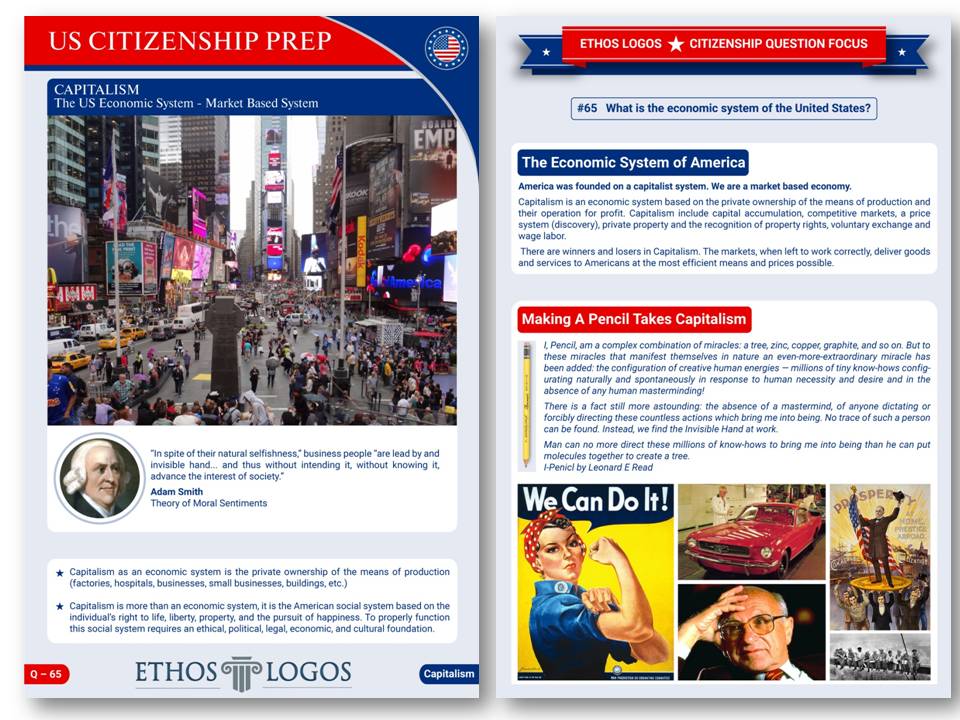
Sample Card – Ethos Logos – US Citizenship Exam Prep
Lincoln stated:
Show me the classrooms in this generation, and I’ll show you the government of the next.
We take that idea seriously and seek to make sure our scholars have a good firm grasp of what it means to be a US citizen. Only 17% of Americans under 45 can pass the US Citizenship Exam. We think that’s got to change. Since history is the arch we use to build the Classical model around, there are numerous opportunities to dig deeper into US Civics.
In our schools, beginning in 5th grade, we introduce the scholars to the actual questions found on the Citizenship Exam. We typically cover 25 questions per grade and set the bar at proficiency by 8th grade. These questions are broken down into easy to read graphical cards which give more than just exam answers but some of the historical context surrounding each question.
The US Citizenship cards have been designed for our charter and homeschool families but we will also be offering the cards and test preparation to the general community via Amazon.com and other outlets. Since 2014, the number of citizenship applications USCIS approved has increased from 653,416 to 843,593 in 2019. During these six years, USCIS approved, on average, 739,980 applications for naturalization per year. Each of these future citizens is a potential customer of this product.
Character Education
Reading, Writing, and Arithmetic JOINS the
Good, True, and Beautiful.
Character education is the development of knowledge, skills, and abilities that help scholars make informed and responsible choices. Character is derived from a Greek word that means “to mark,” as on an engraving. Character education enables students to come face-to-face with the realities of life and have the skill sets to deal with what is presented. Schools see every type of positive and negative home experience walk through the doors and have a role in preparing scholars for the challenges and joys of their lives ahead. The role of schools in partnering and aligning with the families in their care is important not just for academic outcomes but for preparing students for life beyond school. (More on Character Education – VIDEO).
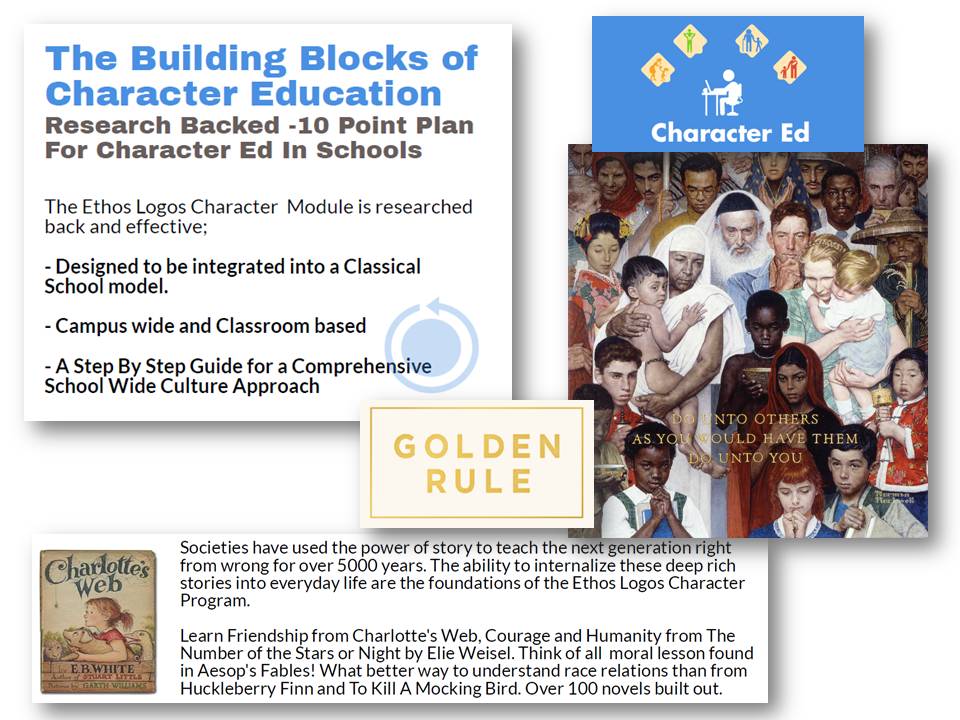
In addition to our Medici Classical curriculum which covers PreK – 12th-grade subjects all aligned to a Classical framework our curriculum team has embedded virtue prompts throughout our subjects which allow our teachers to not only explore what may be on a test but to help our students from what it means to be human.
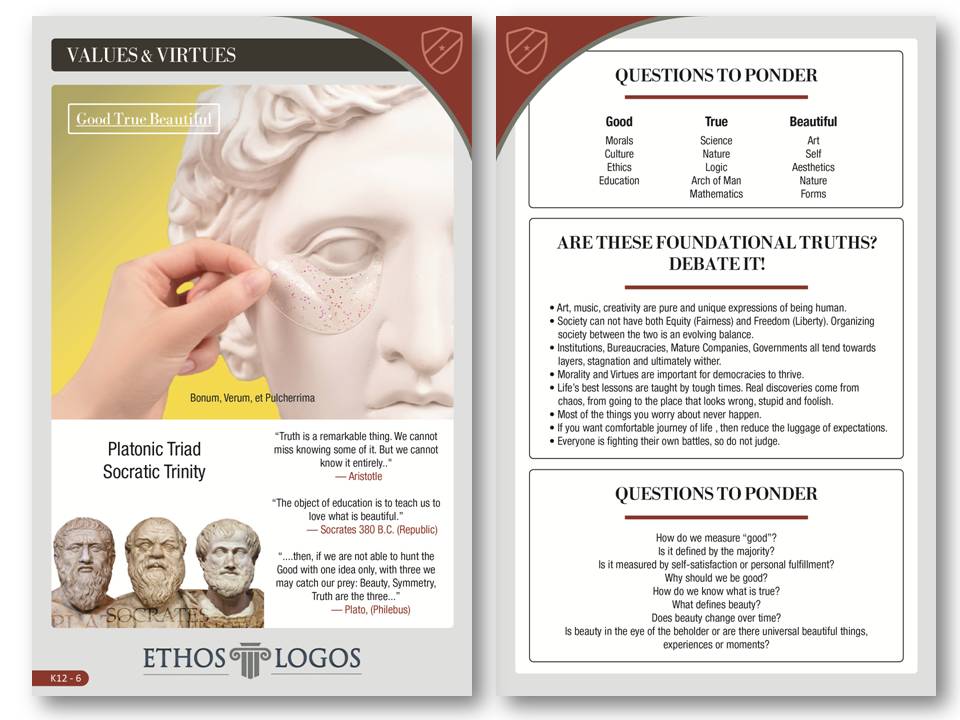
Great Men and Women of History
Teaching History Through The Stories Of History Makers
The idea behind the Great Men and Women of History add-on units is that the teacher can further customize their history units by featuring the lives of heroes and legends that appeared during the particular time frame in history. These Great Men and Women can be tailored to meet the students’ interests or to better culturally represent a historical figure that a student may identify. The goal is for teachers to weave these figures into their instructional lessons. We hope that students can see themselves in these Great Men and Women and one day goes on to change the world.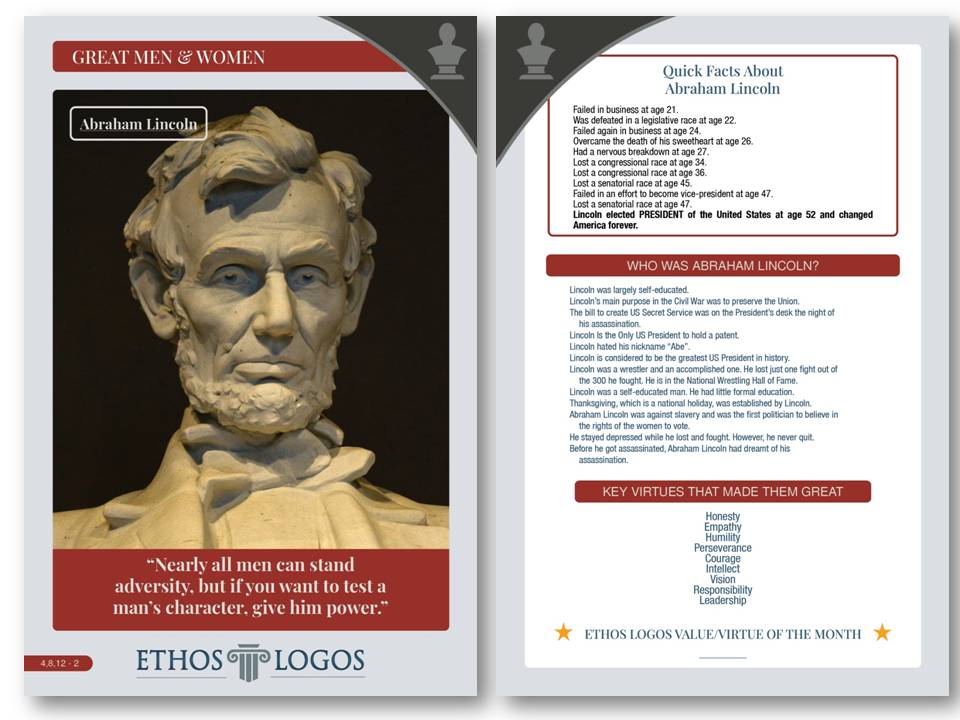
Weaving It All Together
History – Great Men and Women – Values and Virtues
By focusing on history, not just dates and facts and wars but on the stories of courage and grit exhibited by Great Men and Women from the ages, scholars start to see what could be. For generations, we have been sitting around a fire and sharing stories of bravery, moral conflicts, what happens when the hero stumbles, and most importantly how normal people have overcome unbelievable odds to change the world.

The front of the Great Men and Women unit cards have quotes or big questions to dig into on the particular character from history. The back has facts, dates, achievements, movies, or books that may help to further explore the Great Men and Women of history.
The cards also include key Values and Virtues that made these people great. What an amazing way to make history come alive and set an example for your child of what greatness looks like.

English – Language Arts
From Grammar & Spelling to Values & Virtues
English courses in our model are extremely important and have a number of aspects which we’ll bread down below. The Medici Classical English scope, sequence, and selection took years of classroom teacher back and forth to develop. We looked at top Classical schools around the country, interviewed teachers to find out which novels worked and which didn’t. We added and subtracted and continue to do so. As you explore our selections realize that you have complete flexibility of what to teach in English but if you follow our unit (monthly) sequence, the benefits of thematic units and cross-connections which make Classical education so impactful will be seamless.
We are firmly anchored in the classics but we’ve incorporated abridged versions of classic novels for some of our lower grades and full versions for upper grades. The abridged versions introduce students to the famous English, American, European, and World literature. Our curriculum supports are built around novels, plays, poetry, short stories, speeches, and quotations from the great works of literary history.
Since many of these books have been in print for decades, many can be found online for no charge, used, or easily available from online booksellers. (More on the Classical Ed English Program – VIDEO)
Quick Reference Guide To Medici English
- Age Appropriate – We use the Lexile score benchmark to align age-appropriate books to a particular grade. As our scholars get older, they are able to handle more adult topics. Some of the books on our reading lists have been banned over time for being too far to the left or the right politically. We believe that you have total agency as to which books to teach your child and would encourage you to research and read the novels you are teaching. Denying realities of war, racism or human interactions does a disservice to our kids. When we come upon a difficult subject we see those as learning opportunities to critically think and compare and contrast life in the past to life today.
- Literature Review – As your child continues through their education, the ability to dissect, identify and compare literature becomes an important tool. In our digital platform, we help you with pre-built lesson plans then help you and your student identify plot, theme, author’s intent, and much more. In many cases, we suggest snippets of other great works (movies, book exerts, articles, source documents) and spell out ways that you can craft assignments that compare and contrast various literary devices.
- Spelling – Novel Words – Latin – Scripps Spelling – Each unit features a novel. We identify spelling words from the novel and suggest a few ways to have your student learn and master those spelling words. We also include Latin root words and Scripps Spelling words for each month.
- Grammar – In our digital support system, we spell out the grammar targets that your student should have mastered by specific grade levels. Exercises, worksheets, and practices are available to help you both cover the nuances of the English language.
- Historic Alignment – History is the backbone of each of our units. In our system, scholars see a time in history a total of three times. The more we can immerse our students into what it was like to live, work, worship, or experience a particular time the more aware they become of the past and the more context they have to understand current or future events. The powerful combination of history instruction (source documents, facts/dates, Great Men and Women, inventions, scientific advancement, etc.), with arts instruction with deep and rich stories in English, is what Classical education is designed around.
- Value and Virtues – The novels we chose have characters, many the same age as your child, experiencing trials and joys as they move through the story. We have built into our curriculum prompts, suggestions, and training on how has your child experienced those struggles and persevere. At home, you can feature values like Courage or Responsibility, Forgiveness or Humility through the eyes of a particular character in a novel. We give you a number of ways to make these connections all aimed at anchoring a sense of right from wrong.
- Poetry – Age Appropriate and Memorized – Beginning in Kindergarten, each month our students memorize and recite an age-appropriate poem. These poems have been curated and outlined with each English unit. The great poets from history, including Walt Whitman, Robert Frost, Rudyard Kipling, Langston Hughes, Wordsworth, Shakespeare, Longfellow, Shelly, and Robert Lewis Stevenson are all included.
- Plays and Theater In Older Grades – Units in high school include Our Town by Oscar Wilder, Death of A Salesman by Arthur Miller, and more.
- Writing Prompts – Being able to formulate ideas and then communicate those ideas in clear and concise writing is the mark of a well-rounded education. We include in our digital offerings step-by-step training and writing assignments that are tied to our novels and our history prompts. We transverse between, Expository, Opinion/Persuasive, Informative in our English and History subjects and scientific writing in our science units.
- Presentation Skills – Classical Education culminates in the forgotten art of Rhetoric. After years of practice, we strive to ensure that all of our students are able to present their ideas and persuade their audiences. This is done via writing as well as in group presentations. Included in our platform are Capstone projects that are programmed into 5th, 8th/9th, 10th, 11th, and 12th grades. These projects are opportunities for our students to tie everything together and deeply think about what is important to them.
- Balanced Informational Text and Fiction – As we built our model, public schools have a real focus on informational text, which we think is important but our curriculum has a balanced approach with story-driven fiction novels. The power of story is the power of Classical Education and we made sure this balanced approach is included in each unit. For informational text, we cross teach in science, history, and the arts so your child receives an ample amount of informational text. English in our model has a heavier concentration of fiction.
- Socratic Prompts – The power of a great is what Classical Education platforms strive for. Facts, dates, and memorization have their place in K12 education but a deeper understanding and critical thinking take training and time. We have built-in Socratic discussion starters into English and history units. These questions can be used as writing prompts or discussion starters to check your child for a deeper understanding of topics. In science, we’ve put together prompts around the ethics of science and advancements from time. A good teacher and a good Classical Education will always be looking for ways to synthesize content and go deeper into the good, true and beautiful.
- Early Reading Step By Step Plan – Below you will find the specifics of our emergent readers program. We work within the Bookworms platform which has strong research behind it and it has many of the characteristics we look for in a Charlotte Mason – Classical school.
- Charlotte Mason Read Aloud – 18th-century educator, Charlotte Mason advocated for reading to her students using classical stories that may be a bit harder to comprehend than their grade level. She believed that listening, hearing new vocabulary, and gathering inference from context was an important part of learning to read. Our early reading program, Bookworms, believes the same. We recommend continuing read alongs up into 5th or 6th grades.
- Whole Word and Phonetic Awareness – The debate has raged between whole word and phonetic instruction. We integrate both into our curriculum. Bookworms
- Struggling Readers Diagnostics and Tools – Because our curriculum is used in public schools, we’ve built a check and balance system based on the latest in literary research to help you identify reading gaps in your homeschool student. Contact our team for more info on diagnostics and intervention strategies to ensure your child gets the help they need in learning to read.
- Handwriting – Cursive – We strive for mastery of cursive writing by 5th grade. Within our curriculum map, we include learning targets and practice materials to ensure that your child is progressing with their cursive skills at each grade level.
- Dyslexia Accommodations – When available, we include a link to the audio version of most of our assigned novels.
- Benchmark Standards – Should You Wish To Follow – Since our curriculum is built for public and private schools as well as the home school community, we have a number of the state standards called out in the resource folders of each novel unit. You can easily see which skills your child should master by which grade.
Science Done Classically
Deeper Dive – Historic View – Ethical Debates
The science program in Medici Classical supported schools follows a pattern of one full year of Earth Sciences, Biology, Chemistry, and Physics. With the repeating pattern of aligning 3rd to 7th and 11th grades and 4th to 8th and 12th grades and so on, students spend a full year in Chemistry three times in their time at a Classical K-12 school.
Exposing 3rd graders to a full year of Chemistry raised some eyebrows. Teachers that have followed the Medici Classical model have been surprised at the excitement 8-year-olds have toward chemical reactions, states of matter, and the periodic table.
All the concepts covered in state end-of-year assessments are integrated into the full-year immersions found in the Classical model. Refreshers during testing years are embedded in the curriculum mapping to ensure mastery is attained.
The Medici Classical Curriculum Program has built lessons around the new National Science Standards in Arizona, Colorado, Florida, Texas, Indiana, Georgia, Tennessee, and other states as well as incorporating Common Core science standards.
The keys to a Classical Education science program involve a heavy dose of hands-on learning, the fundamental skills of gathering data, and the ability to report on what has been learned through written, oral, and group projects. The scientific method has changed the way we find, test, and discover new advancements in the four scientific disciplines. Scholars learn about the early pioneers in science and advancements that have occurred over the ages.
Unchecked, science can be all-consuming. Our science program prompts the students to have big debates around advancements and discoveries. For every great advancement the ethical dilemmas around testing, pricing, availability, and so on are important to understand. (More information on Math/Science – VIDEO)
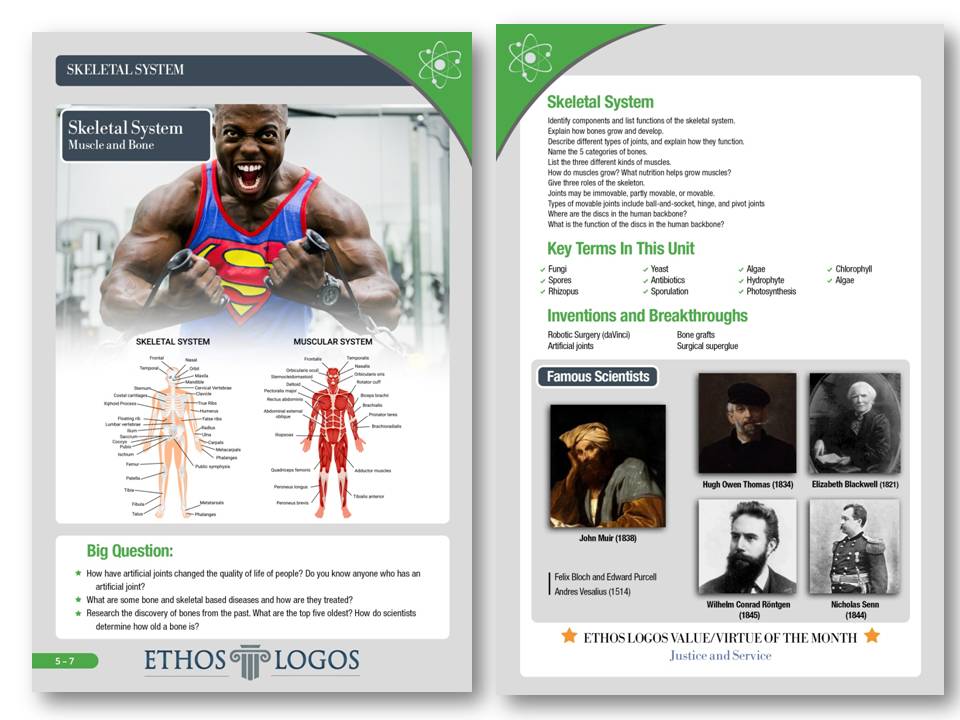
The Arts
Great Musicians and Artists
Appreciate The Good, True, and Beautiful
Instruction in visual and performing arts is a core part of a Classical Education in the Medici Classical program. Beginning in Grammar School, students are exposed to the masterworks of art and music. They learn about the artists and composers, their time, and their impact on humanity. Grammar students begin the hands-on learning of the basics of concepts that will follow them all through their education. When students reach the Logic and Rhetoric Schools, the emphasis is on photography, 3D art, painting, music theory, and choir. Masterwork continues as students practice the concepts they have learned all leading to a deep appreciation of the GOOD, TRUE and BEAUTIFUL.
Art and Music in a Classical school also integrate with subjects such as history or science. In the Logic and Rhetoric Schools, Art and Music often overlap with history and literature. In these classes, students begin to learn the various periods of art and music history as well as artists and composers and their major works. Ethos Logos high school arts move to the advanced choir, orchestra were demanded, and theater and performing arts. (Artist and Musicians in Classical Education – VIDEO)
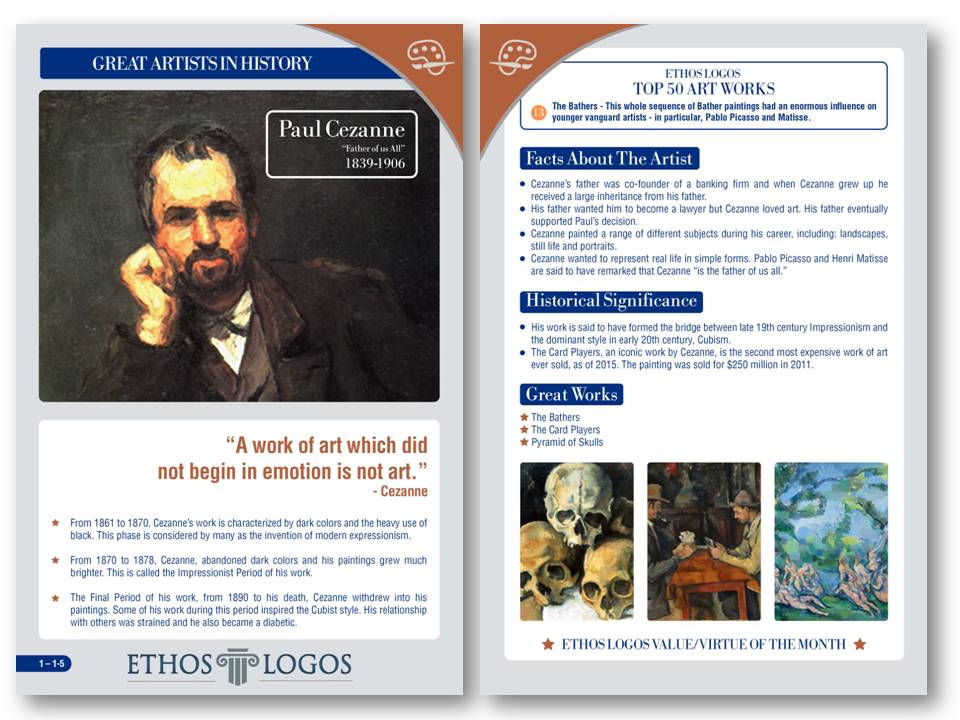
50 Top Artists and 25 Top Musicians In History
Each semester (5 units) we focus on one musician and one artist that left a lasting imprint on history. These artists and musicians span time. We provide curriculum cards for each of the artists, musicians, and time periods. We organized the top 25 and outline on each card, where that particular artist lands in the top 25. We identify their most famous life’s work and some interesting facts about their lives, their genera or impact on the world.
Adding it all together, a year or complete grade worth of cards will include 100 to 100 cards. Each numbered and coded for easy navigation. Packages are available on our web site for a full grade worth of curriculum cards or individually themed packages like US Civics, or Great Men and Women of History.
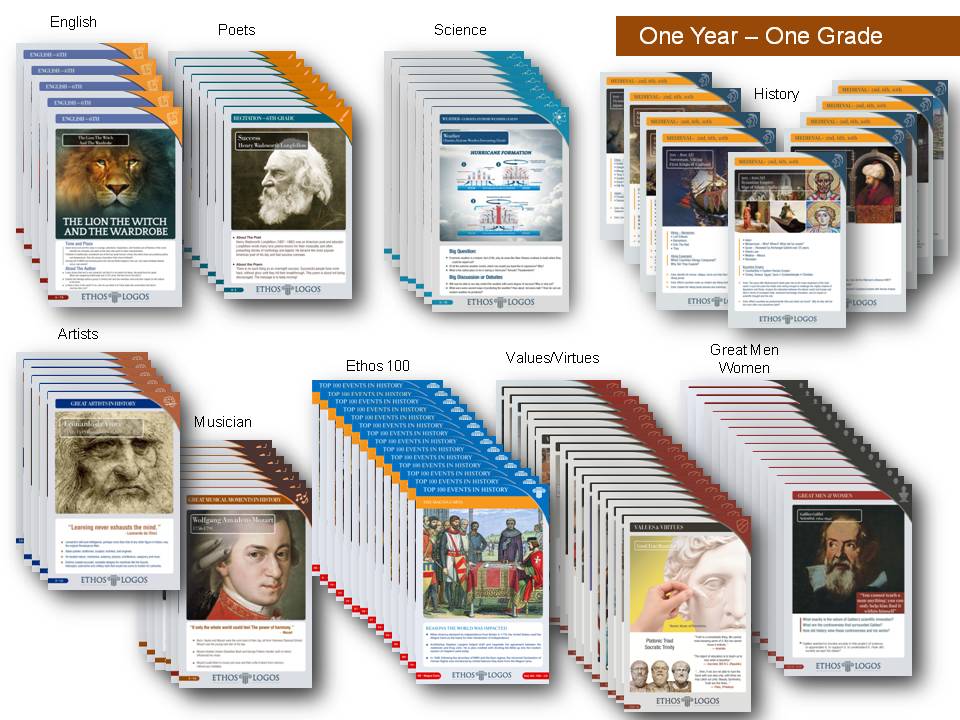
Digital Support to Medici Classical
Behind the Unit Cards and workbooks is a full digital support platform that will guide your family through each subject, each grade on a day-by-day basis. We built out this platform using a learning management system (LMS) specifically used in American schools. (Digital Resources Curriculum Resource Introduction – VIDEO and Digital Resources A Tour – VIDEO)
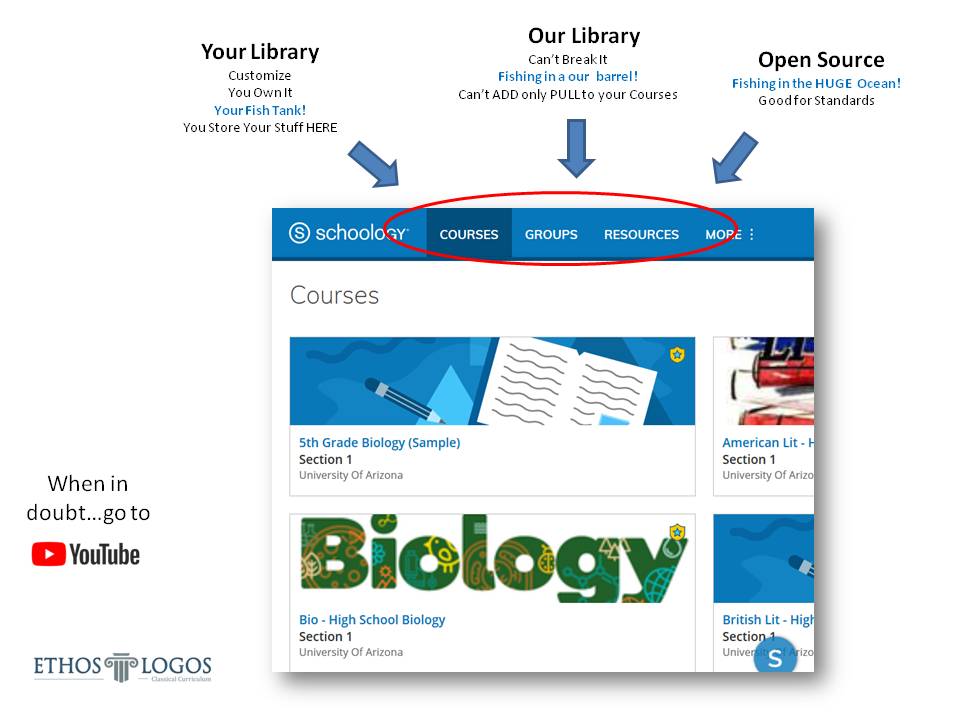
Using the LMS, we provide you with a course code. Once you enter the course code into your digital login, you can access a library full of resources that help you to teach a particular unit. Each month, you will receive the months worth of course codes for:
History
English
Math (Saxon)
Science
Artists
Musicians
Values and Virtues
Once you have the class code, you enter the code into your library, and then you can pull over all the resources we’ve put together to teach a particular month-long unit. These resources have been built over years of classroom experiences. We provide you with a series of folders, lessons, prompts, quizzes, and powerpoints or videos to first introduce a topic or subject to your scholar, then create assignments that allow them to research and dig deeper into subjects.
Not Faith-Based But Faith Friendly
The Medici Classic Curriculum was built and designed for use in American public schools. Many of our curriculum drafters are faith-based and many are not. We all understand what it takes to be successful in American public education and have the goal of partnering with our families in the classrooms or in the home school setting. The homeschool community is democratically wide and includes atheists, Christians, and Mormons and conservatives, libertarians, and liberals; low, middle, and high-income families; black, Hispanic, and white; parents with Ph. D.s, GEDs, and no high school diplomas. We don’t care what your background is, we are here to help you be successful in preparing your child for the future.
You chose to homeschool because you want to control influences on your child’s life. We respect that and allow you to fully customize any and all of our curriculum offerings. The classical novel selection has been curated to ensure language and themes are age-appropriate and science units are presented so that you can review and discuss both sides of issues or topics that may align differently with specific family beliefs. Muslim, Christian, Jewish, Hindu, Buddhist, each of your belief systems is personal and important to you and your family. Our goal is to respect and present topics in a fairway.
Ensure Your Child Is On Track And Prepared
Underling, all the content, lesson plans, digital and print materials are standards that are clearly laid out for the homeschool family and the classroom teacher alike. We listened to our homeschool families and heard that they were concerned that their child was on track with their peers in public schools. By building out our monthly by month, week by week, and day by day instructional plan you can easily see how your child is doing against others in their grade level in your state and nationally. You chose homeschooling because of the flexibility, Medici Classical honors that choice and provides you with options to assess for standards at each grade level, or not.
Teachers in a Classical Education System
Teachers and staff see themselves not just as educators, but as students too. Like all good schools, we focus on the technical aspects of education from lesson planning, student engagement, and the latest in brain research. But what is different in our Classical schools is that teachers put an intentional effort into going beyond standards and tests, to focus on the whole child learning experience. Our teachers work toward exposing our scholars to the values and virtues that accompany ideas and concepts. When teachers join us, we have to almost “unlearn them” from the conditioning of their past. 80% of teachers choose their profession to make a difference in the lives of children, yet most have been so focused on high-stakes testing that the big discussions that help develop character take a back seat. In our schools, we help our instructional staff slow down, go deep, and have those impactful moments that connect emotionally. (Teacher Hiring and Training VIDEO)
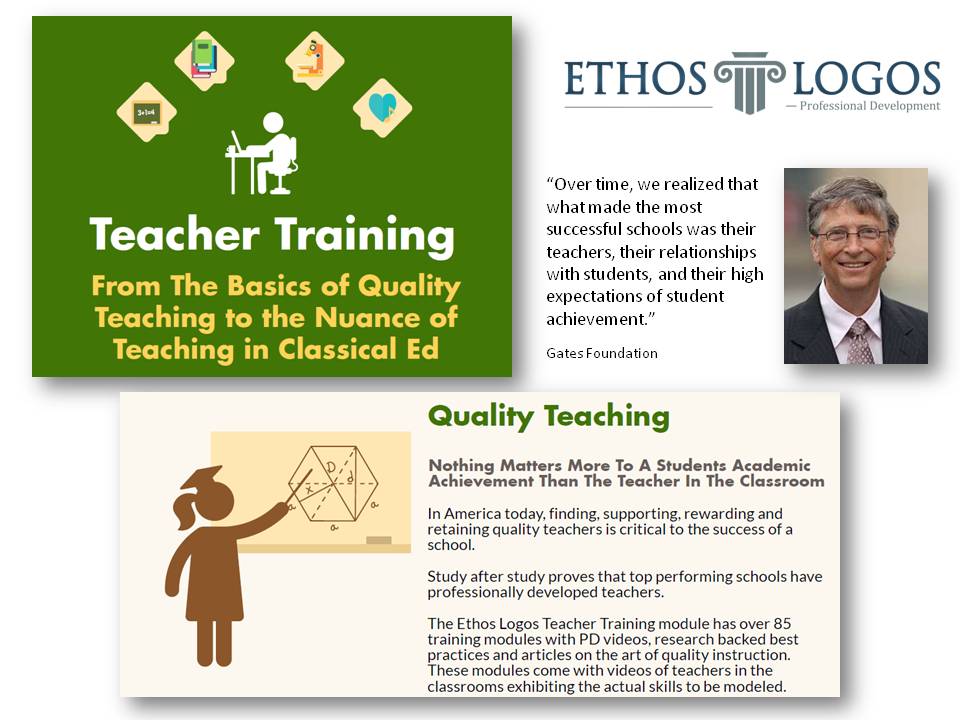
We look for and encourage our teaching staff to be LIFE LONG LEARNERS. Like Doctors or Lawyers, Teachers are professionals that are forever perfecting their craft. A lifelong pursuit of learning and improving our professional skills are a prerequisite to teaching in one of our schools.
We invest heavily in PROFESSIONAL DEVELOPMENT (PD). Our PD Director oversees the professional growth of all of our teachers — from on-site PD Coaches to Principals that were sought out for their academic leadership and on down to intentional mentor groups and small teams that support each other. We have created virtual platforms to share lessons and best practices across campuses with other grade-level instructors. Think of it as a Facebook group for 200+ 4th-grade teachers from around the US, all on the same team. No longer are teachers alone and siloed off in their classrooms.
Our PD Department has created monitoring tools that give us feedback on how the teachers are advancing in their profession. All our leaders are calibrated to understand what is expected and what good Classical teaching looks like. We provide our professional teachers with virtual training where they can watch our top instructors demonstrating a particular technique in a live classroom. Our training also involves job-embedded training, one on one coaching, and a mentorship program that allows seasoned teachers to help newer colleagues. We exercise GRACE but have clear BOUNDARIES for all our staff, just like we expect them to model these traits in the classroom. The practice of teaching, like the practice of other professions, is a lifelong endeavor and we help teachers get a little better every day.
Our teachers work hard, plan hard, have fun and share with each other their best practices. Behind the scenes, we have built out a cloud-based curriculum resource that puts Classical and Standards-aligned curriculum lesson plans and resources together that can be customized to match the teacher and their particular style. I like to equate the curriculum offerings to a MENU and a BUFFET. The menu is at the teacher’s disposal, to cover a particular day/week or month-long unit, or they can visit the buffet and choose from thousands of resources to make their instruction impactful. We have built out EXIT TICKETS which give a teacher (and parent) the big ending targets for History, Art, Music, English, and Science. How each teacher gets there is up to their professional judgment.
The Power of Teachers in Character Education
Ask most teachers why they chose the profession of teaching and undoubtedly you will hear their desire to impact individual students and their communities. Study after study including a recent survey of 3,000 teachers, (Ni and Rorrer, 2018) show that results point to the three areas that rise to the top for the WHY of a teacher.
Desire to make a worthwhile difference in the lives of children (85%)
Desire to contribute to the greater societal good (70%)
Experience working with children/young adults (64%).
The Ethos Logos Character Program is designed to tap into the WHY a teacher chose their profession, perhaps rekindle the love of teaching in those that have been too focused on standards and testing, and tap into the power of great stories that have been the basis for passing ideas from one generation to another for millennia. The Ethos Logos Character Program provides a buffet of tools, aligned to the classroom curriculum of instruction in core content areas that help teachers to deliver quality character education. In addition to the resources, a comprehensive training and delivery system for classroom and school-wide character development is embedded in all the Ethos Logos Character Program offerings.
We Operate Top Rate Classical Charter Schools
The Medici Classical Curriculum platform was built and perfected in classrooms. After years and years of experience, what emerged is the K12 platform that we are now sharing with homeschool families. Day by day granularity or wide themes that you can fill in as you see fit. We can now deliver print and digital products that help your family receive the same high-quality instruction that occurs in top schools.
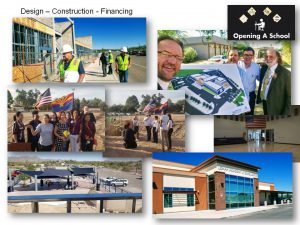 As you learn more about our program you’ll find that we’ve addressed a number of the issues that home school parents are struggling with. We’ve built our subjects with the home school mom in mind. Whether you are brand new or a seasoned teacher, we’ve made our curriculum delivery plan both specific and day by day and wide enough for you to use our resources and create your own educational story. No two children are alike and only you know the unique interests of your child, by making our curriculum offerings flexible you can find what your child is interested in and nourish those interests with content that goes way above and beyond a standard textbook.
As you learn more about our program you’ll find that we’ve addressed a number of the issues that home school parents are struggling with. We’ve built our subjects with the home school mom in mind. Whether you are brand new or a seasoned teacher, we’ve made our curriculum delivery plan both specific and day by day and wide enough for you to use our resources and create your own educational story. No two children are alike and only you know the unique interests of your child, by making our curriculum offerings flexible you can find what your child is interested in and nourish those interests with content that goes way above and beyond a standard textbook.
A Tour Through One Of Our Schools
When you walk into one of our Medici Classical schools you will notice something different. From a happy staff member greeting you at the front desk to busy scholars in the hallway holding open the door for adults. Ask a scholar what makes us different and you’ll hear a heartfelt story about a teacher that made a connection, or a project in art, or about friends on the playground. Stop a parent and you’ll hear a story about how their child likes school again or the lively dinner table conversations about a time in history that made an impact.
The trademark of all our supported schools is a TEACHER that loves and is passionate about kids, SCHOLARS that work hard while having fun, and PARENTS that are partners on our scholar’s academic journey. (What Is Classical Education – VIDEO)
At every level of our organization, we model service above self as defined by Robert Greenleaf’s work from 1977, Servant Leadership. In practice, this means that from the CEO to our custodians and from our Teachers to Principals, we strive for a culture that focuses on how we can help others. Each team member wakes up with the singular goal of preparing our scholars for what lies ahead. Can you think of any bigger job?
Charlotte Mason Influence
When you think about Classical Education there are some consistencies across most campuses:
The stages of learning (Trivium),
An intentional focus on character education
A priority on the arts and an appreciation of the Good, True, and Beautiful
A canon of novels based on time tested stories
But in our model, we blend the ideas of a 19th-century education pioneer, Charlotte Mason, into the essence of how we deliver instruction.
Our schools are a blend of rigorous Classical Education found in many private schools and the Charlotte Mason influences adopted by Home School families around the US. It’s nuanced but important, the Charlotte Mason influence adds living books, nature study, and a belief that scholars are adults becoming. The blend is a concentration on academic rigor and character development all the while keeping the learning environment focused on the students and FUN.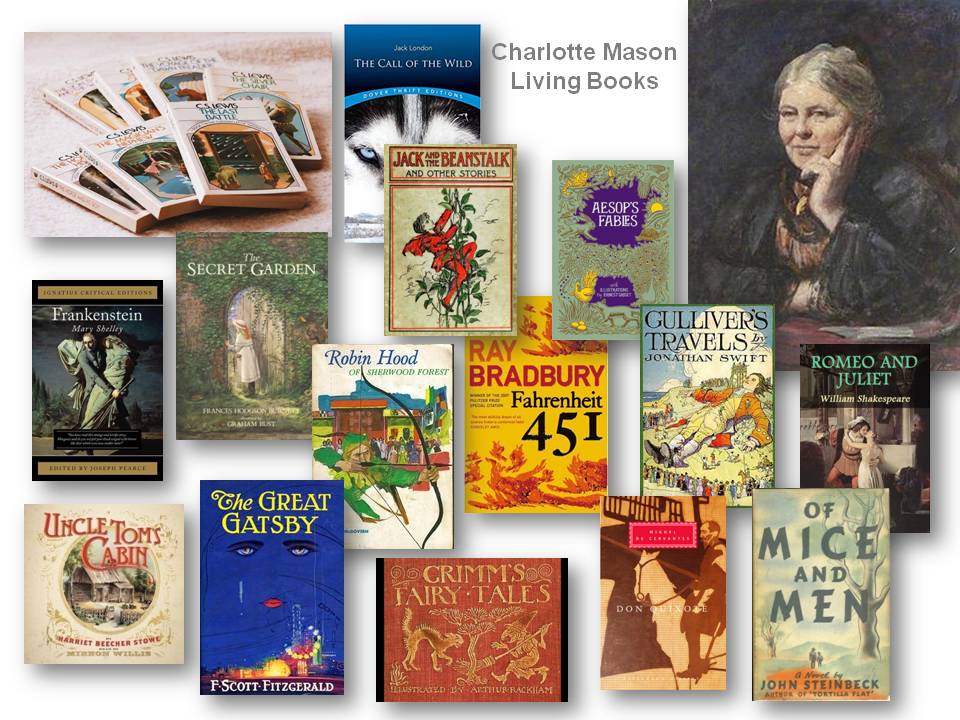
The Charlotte Mason influence focuses on the students as adults becoming and two key ideas that our schools embed into the Classical model are “Education is an atmosphere, a discipline, a life” and “Education is the science of relations.” Her motto for students was “I am, I can, I ought, I will.”
Mason coined the phrase “living books that spark the imagination of the child through the subject matter.” I know that this concept can be nuanced to you as a parent but the best way I can surmise the blend of our model between Classical and Charlotte Mason is that the Classical element is the black and white photo of an Ansell Adams and the Charlotte Mason is the vibrant pallet of a Monet. Both are masterpieces. The combination of the two complements each with the other and has overlapping mastery, but very different styles.
Both Charlotte Mason and Classical Education have been top choices for home school families and private Christian schools for over 100 years. The Ethos Logos platform has simplified, combined, and packaged the two educational models into one easy to follow plan.
A School That Is Based on Relationships
We are schools built on RELATIONSHIPS. The reason we believe that we have been so successful is that we are rooted in the works of Dr. Rudolf Dreikers and Dr. William Glasser whose research demonstrated that issues and conflicts in a school or a family come down to a breakdown in relationships.
We understand that the most impactful part of our school is the TEACHER in the classroom and we invest heavily in their professional growth. Our mission is to PARTNER with our PARENTS because we understand that you are the primary educator in your child’s life. As a school of choice, we know who we are and what we stand for.
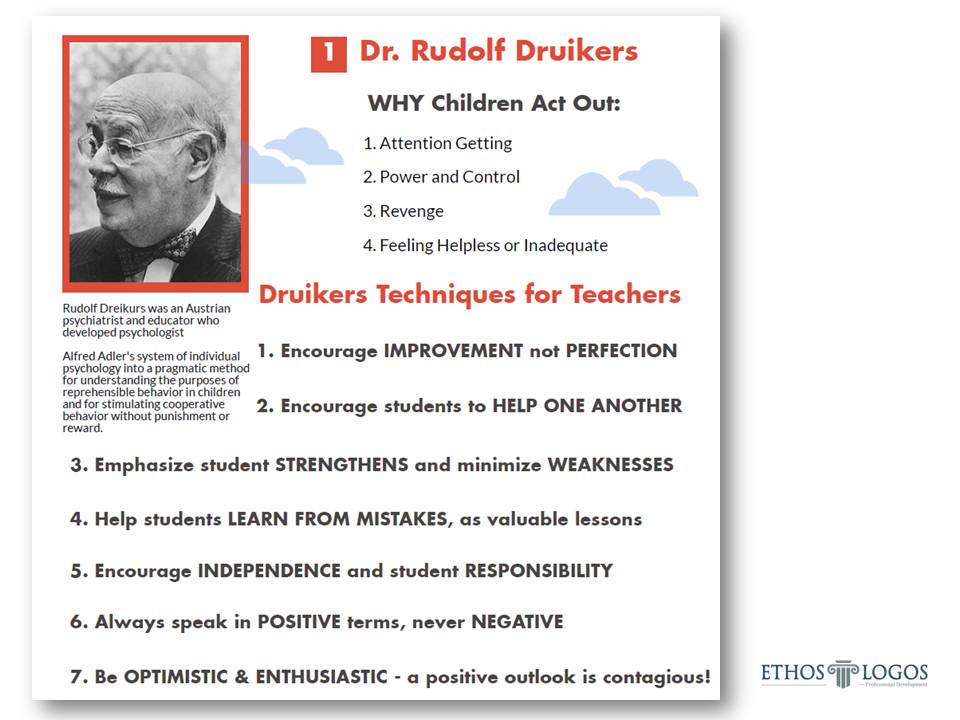
At our campuses, we are proud to be educational leaders modeling what we expect from our students. We want our students to focus on learning as a process, to enjoy the discovery, to wrestle with the big ideas. Our schools should always feel safe and encourage scholars to take risks, to practice curiosity and compassion.
We are committed to building a diverse, inclusive school where all people have the opportunity to develop their voices and not only feel recognized, but valued. Perhaps most importantly, we are dedicated to graduating good citizens who are well prepared for college and the challenges of tomorrow’s world. Nothing gives me more joy than speaking with parents about the changes in their children because of the impact a Teacher, Principal, or our model has had on their family.
I invite you to contact our Admissions team at any of our Ethos Logos supported campuses to arrange a visit. You will find a warm community of active, dedicated learners ready to welcome you and your children.
Our foundations for culture and our approach to discipline are built on the works of Adlerian psychologists, Dr. Rudolf Dreikers and Dr. William Glasser. Their work focused on the root causes of discipline issues, the role of choices to encourage desired outcomes and a pursuit of excellence — but with consequences. We look at mistakes as learning opportunities and work closely with families to ensure we are aligned in our focus.
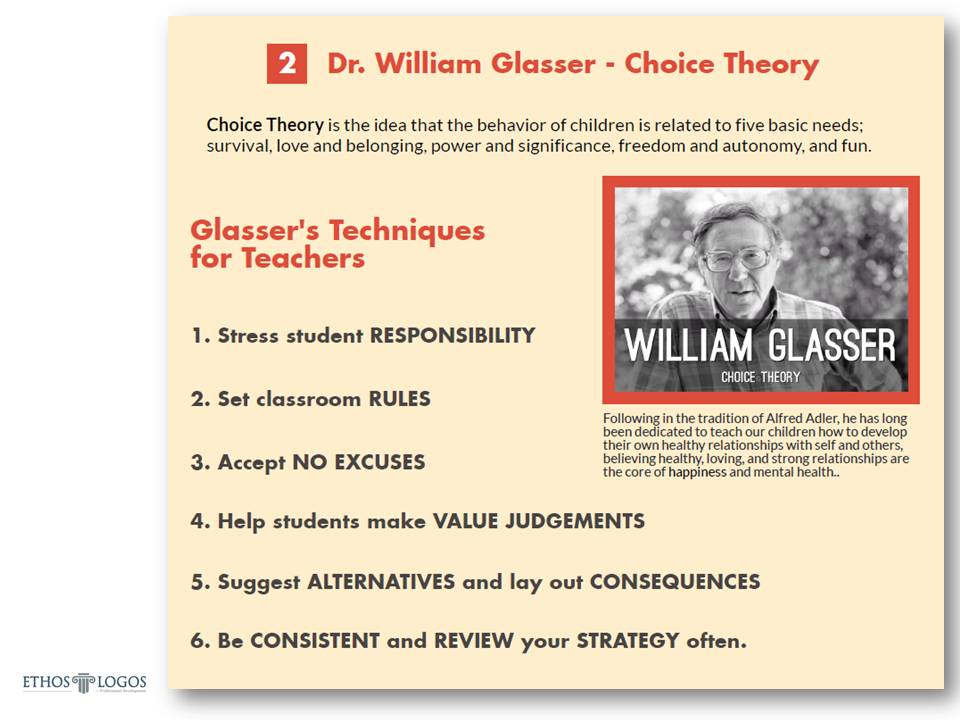
To cultivate a student’s character it becomes clear that we must focus on every aspect of a student’s experience on campus. From the way the staff communicates with the students, the dress code, the paint, and posters on the wall, the activities during recess, the way technology is integrated, the school assemblies, and the way students transfer orderly through the hallways, all reflect on what is important. Our school leadership must focus on academic standards and social-emotional learning in order to prepare their students for the world.
Everything the school does teaches something.
Everything the school does is educational.
All decisions, policies, curriculum, and all details of the school’s life should constantly be reviewed through the lens of teachable moments.
The 7 Deadly Sins – We All Got Them, Control Them….Or Else
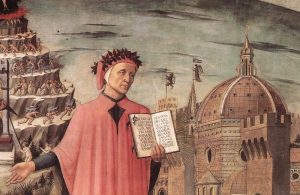 My journey from entrepreneur to politics to education has helped me see the world from many different angles. The journey from success to failure has made me do some soul searching and the humbling experiences have caused me to pause and ask, what’s the meaning of life?. I’ve blogged and detailed where I think we are as a society. A deep dive into history and the rise and fall of civilizations start to paint a picture of where we are heading. (See Decline of America).
My journey from entrepreneur to politics to education has helped me see the world from many different angles. The journey from success to failure has made me do some soul searching and the humbling experiences have caused me to pause and ask, what’s the meaning of life?. I’ve blogged and detailed where I think we are as a society. A deep dive into history and the rise and fall of civilizations start to paint a picture of where we are heading. (See Decline of America).
I’ve compiled great ideas that speak to me on the economic, spiritual, historical, health and evolution of society that all helped me to understand what makes me tick and what makes my organizations, my local community, my country and the world work. (Deep Thoughts – The Whys of The Human Condition). You can spend hundreds of hours digging through all these categories and topics as I’ have and arrive at your own conclusions. I put forth my theory but highly encourage you to follow the Budda’s quote to “Believe nothing that you hear, half of what you see, and all of what you feel.” Basically, I humbly ask that you take all that I’m presenting to you with a grain of salt. Review everything from your own lense. 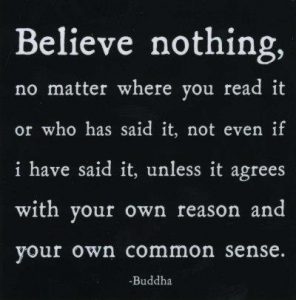
I am not a philosopher, although I study and learn from the greatest philosophers in history and I philosophize every day. I am not a historian, although I’ve dug in enough to history to learn from its patterns. I am not a theologian although I understand world religions and have arrived at what faith is to me. I am not a motivational coach, although I mentor and lead and work to improve those around me all the time. I am not the wisest, smartest or richest but I know my constant quest for learning from others, my ability to keep going when most give up and my abundant blessings make me appreciate each day and each gift I have been given, often times, more so than others with more graces than I’ve been given.
I’ve been blessed with good business skills that have been honed over 25 years of successes and failures. I’ve spent my 10,000 hours of deliberate practice on morning drive-time radio interviewing small business owners, authors, and political leaders, and have developed a skill that continues to serve me every day. I’ve been blessed with men that have appeared in my life at key times and mentored me in positive and supportive ways.
I put all this out to you, as the reader, to warn you that I am no expert. This book is deeply personal and what I’ve learned. My journey and yours are not the same. The goal of putting these ideas on paper is to lay out an argument. My hope is that you’ll see something in this work that turns on a light bulb for you. Perhaps something I describe will anger you and make you want to dig in for yourself to prove me wrong. Hopefully, something in here will strike a cord and help you to finally see an event in your life with greater clarity. In the end, this is about me, and I hope to share it with others that could possibly benefit.
I strive to live the life of my favorite Rudyard Kipling poem ‘IF’. Some days are better than others. I’ve learned what my shadows are and how they show up in my life every day. I strive to live Aristotle’s Golden Mean and control the ups and downs that have torn men apart for over 6,000 years. I have found my current thought leaders and philosophers and I have looked back into history to pull the parts and pieces of great minds that have influenced the world. I watch the news or events of the day with a critical eye. The ability to label a sports cheating scandal or a political infidelity scandal through the lens of the 7 Deadly Sins has been a powerful way that I attempt to make sense of the senseless. In my professional life, I chose to associate with people that are on the journey of self-discovery. I am prepared to be disappointed, as they will be disappointed in me. I leave space for forgiveness and grace and I’m willing and capable of parting ways with people that aren’t willing to self-reflect and evolve.
I put forth, that all these topics and all this research lead to a theory that explains why we do what we do that was put forth in the 3rd century by Christian Desert Fathers, and popularized by 14th-century artist rendition of Dante’s Inferno. Now you must understand history to realize how heavily this theory is rooted in Christianity. From the monks in the 4th century to Dante’s work in the 14th century, the Christian faith ran most of the free world. The Rennaissance and Martin Luther Treatise had not rocked the world and the role of faith, almost as the political controller of the masses. If you are not Christian, or you do not believe in Heaven, Hell or Purgatory, that’s fine. Take the ideas that are put forth in the 7 Deadly Sins and put them through your own lens. The ancient Greeks and Romans were putting forth similar ideas and they worshiped pagan gods. I see many of Dante’s ideas in the work of the Stoic’s which started with Zeon in 300 bc and were popularized in Marcus Aurelius’ medications in 200 AD. Don’t let your faith, whatever it may be, get in the way of the message of this book.
The root of it all;
- All the motivations that cause businesses to flourish or perish,
- The map that spells out why dictators rise and fall,
- The blueprint that spells out how to have a happy life
- A guide book that shows the path for a happy marriage and family
Can be learned if you follow the role of the 7 Deadly Sins and how they show up in your life.
The 7 Deadly Sins
The capital or cardinal sins are the big ones that are transgressions that knock our spiritual journey towards God off track. First written about by the Desert Fathers in the 3rd Century and formalized to 7 or 8 major sins by Evagrius the Solitary, a Christian monk and one of the most influential theologians of the 4th Century. The 7 Deadly Sins were made famous in the 14th Century in artworks by Dante’s Purgatory, which souls are grouped on Mount Purgatory by their cardinal sins.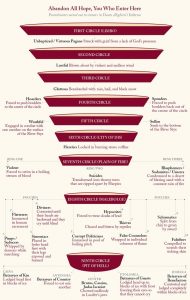
The 7 Deadly Sins were translated into the Latin of Western Christianity thus becoming part of the Western tradition’s Catholic devotions. In Latin, the categories were defined as;
- Gula (gluttony)
- Luxuria/Fornicatio (lust, fornication)
- Avaritia (avarice/greed)
- Superbia (pride, hubris)
- Tristitia (sorrow, despair, despondency)
- Ira (wrath)
- Vanagloria (vanity, glory)
- Acedia (sloth)
These “evil thoughts” can be categorized into three types:
- lustful appetite (gluttony, fornication, and avarice)
- irascibility (wrath)
- mind corruption (vainglory, sorrow, pride, and discouragement)
In AD 590 Pope Gregory I revised this list to form the more common list. Gregory combined tristitia with acedia, and vanagloria with superbia, and adding envy. Gregory’s list became the standard list of sins. Thomas Aquinas uses and defends Gregory’s list in his Summa Theologica. The Anglican Communion, Lutheran Church, and Methodist Church, among other Christian denominations, continue to retain this list. Moreover, modern day evangelists, such as Billy Graham have explicated the seven deadly sins. (Wikipedia)
The capital sins from lust to envy are generally associated with pride, which has been labeled as the father of all sins, etc.
Pride
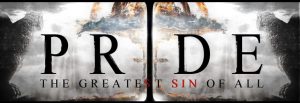 Pride (Latin, superbia) is considered, on almost every list, the original and most serious of the seven deadly sins: the perversion of the faculties that make humans more like God—dignity and holiness. It is also thought to be the source of the other capital sins. Also known as hubris, or futility, it is identified as dangerously corrupt selfishness, the putting of one’s own desires, urges, wants, and whims before the welfare of people.
Pride (Latin, superbia) is considered, on almost every list, the original and most serious of the seven deadly sins: the perversion of the faculties that make humans more like God—dignity and holiness. It is also thought to be the source of the other capital sins. Also known as hubris, or futility, it is identified as dangerously corrupt selfishness, the putting of one’s own desires, urges, wants, and whims before the welfare of people.
In even more destructive cases, it is irrationally believing that one is essentially and necessarily better, superior, or more important than others, failing to acknowledge the accomplishments of others, and excessive admiration of the personal image or self (especially forgetting one’s own lack of divinity, and refusing to acknowledge one’s own limits, faults, or wrongs as a human being).
As pride has been labeled the father of all sins, it has been deemed the devil’s most prominent trait. C.S. Lewis writes, in Mere Christianity, that pride is the “anti-God” state, the position in which the ego and the self-care directly opposed to God: “Unchastity, anger, greed, drunkenness, and all that, are mere fleabites in comparison: it was through Pride that the devil became the devil: Pride leads to every other vice: it is the complete anti-God state of mind.” Pride is understood to sever the spirit from God, as well as His life-and-grace-giving Presence.
In Ancient Athens, hubris was considered one of the greatest crimes and was used to refer to the insolent contempt that can cause one to use violence to shame the victim. This sense of hubris could also characterize rape. Aristotle defined hubris as shaming the victim, not because of anything that happened to the committer or might happen to the committer, but merely for the committer’s own gratification.The word’s connotation changed somewhat over time, with some additional emphasis towards a gross over-estimation of one’s abilities.
Dante’s definition of pride was “love of self-perverted to hatred and contempt for one’s neighbor”.
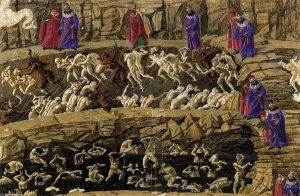
Benjamin Franklin said “In reality, there is, perhaps no one of our natural passions so hard to subdue as pride. Disguise it, struggle with it, stifle it, mortify it as much as one pleases, it is still alive and will every now and then peep out and show itself; you will see it, perhaps, often in this history. For even if I could conceive that I had completely overcome it, I should probably be proud of my humility.”
The proverb “pride goeth (goes) before destruction, a haughty spirit before a fall” (from the biblical Book of Proverbs, 16:18)(or pride goeth before the fall) is thought to sum up the modern use of pride. Pride is also referred to as “pride that blinds,” as it often causes a committer of pride to act in foolish ways that belie common sense.[45] In other words, the modern definition may be thought of as, “that pride that goes just before the fall.”
Lust
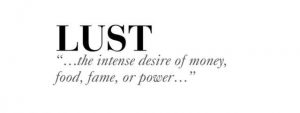 Lust, or lechery (Latin, “luxuria” (carnal)), is intense longing. It is usually thought of as intense or unbridled sexual desire,[22] which leads to fornication, adultery, rape, bestiality, and other immoral sexual acts. However, lust could also mean simply desire in general; thus, lust for money, power, and other things are sinful. In accordance with the words of Henry Edward Manning, the impurity of lust transforms one into “a slave of the devil”.
Lust, or lechery (Latin, “luxuria” (carnal)), is intense longing. It is usually thought of as intense or unbridled sexual desire,[22] which leads to fornication, adultery, rape, bestiality, and other immoral sexual acts. However, lust could also mean simply desire in general; thus, lust for money, power, and other things are sinful. In accordance with the words of Henry Edward Manning, the impurity of lust transforms one into “a slave of the devil”.
Lust, if not managed properly, can subvert propriety.
In Dante’s Purgatorio, the penitents walk deliberately through the purifying flames of the uppermost of the terraces of Mount Purgatory so as to purge themselves of lustful thoughts and feelings and finally win the right to reach the Earthly Paradise at the summit. In Dante’s Inferno, unforgiven souls guilty of the sin of lust are whirled around for all eternity in a perpetual tempest, symbolic of the passions by which, through lack of self-control, they were buffeted helplessly about in their earthly lives.
Gluttony
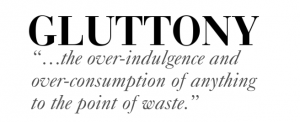 Gluttony (Latin, gula) is the overindulgence and overconsumption of anything to the point of waste.
Gluttony (Latin, gula) is the overindulgence and overconsumption of anything to the point of waste.
In Christianity, it is considered a sin if the excessive desire for food causes it to be withheld from the needy.
Because of these scripts, gluttony can be interpreted as selfishness; essentially placing concern with one’s own impulses or interests above the well-being or interests of others. During times of famine, war, and similar periods when food is scarce, it is possible for one to indirectly kill other people through starvation just by eating too much or even too soon.
Greed
 Greed (Latin, avaritia), also known as avarice, cupidity, or covetousness, is, like lust and gluttony, a sin of desire. However, greed (as seen by the Church) is applied to an artificial, rapacious desire and pursuit of material possessions. Thomas Aquinas wrote, “Greed is a sin against God, just as all mortal sins, in as much as man condemns things eternal for the sake of temporal things.” In Dante’s Purgatory, the penitents were bound and laid face down on the ground for having concentrated excessively on earthly thoughts. Hoarding of materials or objects, theft and robbery, especially by means of violence, trickery, or manipulation of authority are all actions that may be inspired by Greed. Such misdeeds can include simony, where one attempts to purchase or sell sacraments, including Holy Orders and, therefore, positions of authority in the Church hierarchy.
Greed (Latin, avaritia), also known as avarice, cupidity, or covetousness, is, like lust and gluttony, a sin of desire. However, greed (as seen by the Church) is applied to an artificial, rapacious desire and pursuit of material possessions. Thomas Aquinas wrote, “Greed is a sin against God, just as all mortal sins, in as much as man condemns things eternal for the sake of temporal things.” In Dante’s Purgatory, the penitents were bound and laid face down on the ground for having concentrated excessively on earthly thoughts. Hoarding of materials or objects, theft and robbery, especially by means of violence, trickery, or manipulation of authority are all actions that may be inspired by Greed. Such misdeeds can include simony, where one attempts to purchase or sell sacraments, including Holy Orders and, therefore, positions of authority in the Church hierarchy.
As defined outside Christian writings, greed is an inordinate desire to acquire or possess more than one needs, especially with respect to material wealth.[29] Like pride, it can lead to not just some, but all evil..
Sloth
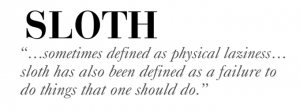 Sloth (Latin, tristitia or acedia (“without care”)) refers to a peculiar jumble of notions, dating from antiquity and including mental, spiritual, pathological, and physical states.[30] It may be defined as absence of interest or habitual disinclination to exertion.
Sloth (Latin, tristitia or acedia (“without care”)) refers to a peculiar jumble of notions, dating from antiquity and including mental, spiritual, pathological, and physical states.[30] It may be defined as absence of interest or habitual disinclination to exertion.
The scope of sloth is wide. Spiritually, acedia first referred to an affliction attending religious persons, especially monks, wherein they became indifferent to their duties and obligations to God. Mentally, acedia has a number of distinctive components of which the most important is affectlessness, a lack of any feeling about self or other, a mind-state that gives rise to boredom, rancor, apathy, and a passive inert or sluggish mentation, Physically, acedia is fundamentally associated with a cessation of motion and an indifference to work; it finds expression in laziness, idleness, and indolence.
Sloth has also been defined as a failure to do things that one should do. By this definition, evil exists when “good” people fail to act.
In his Purgatorio Dante portrayed the penance for acedia as running continuously at top speed.
Dante describes acedia as the failure to love God with all one’s heart, all one’s mind and all one’s soul; to him it was the middle sin, the only one characterized by an absence or insufficiency of love. Some scholars have said that the ultimate form of acedia was despair which leads to suicide.
Wrath
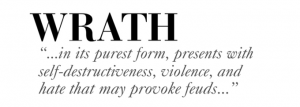 Wrath (Latin, ira) can be defined as uncontrolled feelings of anger, rage, and even hatred. Wrath often reveals itself in the wish to seek vengeance. In its purest form, wrath presents with injury, violence, and hate that may provoke feuds that can go on for centuries. Wrath may persist long after the person who did another a grievous wrong is dead. Feelings of wrath can manifest in different ways, including impatience, hateful misanthropy, revenge, and self-destructive behavior, such as drug abuse or suicide.
Wrath (Latin, ira) can be defined as uncontrolled feelings of anger, rage, and even hatred. Wrath often reveals itself in the wish to seek vengeance. In its purest form, wrath presents with injury, violence, and hate that may provoke feuds that can go on for centuries. Wrath may persist long after the person who did another a grievous wrong is dead. Feelings of wrath can manifest in different ways, including impatience, hateful misanthropy, revenge, and self-destructive behavior, such as drug abuse or suicide.
“People who fly into a rage always make a bad landing.”
— Will Rogers
Envy
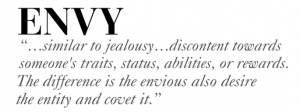 Envy (Latin, invidia), like greed and lust, is characterized by an insatiable desire. It can be described as a sad or resentful covetousness towards the traits or possessions of someone else. It arises from vainglory and severs a man from his neighbor.
Envy (Latin, invidia), like greed and lust, is characterized by an insatiable desire. It can be described as a sad or resentful covetousness towards the traits or possessions of someone else. It arises from vainglory and severs a man from his neighbor.
Malicious envy is similar to jealousy in that they both feel discontent towards someone’s traits, status, abilities, or rewards. A difference is that the envious also desire the entity and covet it. Envy can be directly related to the Ten Commandments, specifically, “Neither shall you covet… anything that belongs to your neighbor” – a statement that may also be related to greed. Dante defined envy as “a desire to deprive other men of theirs”. In Dante’s Purgatory, the punishment for the envious is to have their eyes sewn shut with wire because they gained sinful pleasure from seeing others brought low. According to St. Thomas Aquinas, the struggle aroused by envy has three stages: during the first stage, the envious person attempts to lower another’s reputation; in the middle stage, the envious person receives either “joy at another’s misfortune” (if he succeeds in defaming the other person) or “grief at another’s prosperity” (if he fails); the third stage is hatred because “sorrow causes hatred”.
Envy is said to be the motivation behind Cain murdering his brother, Abel, as Cain envied Abel because God favored Abel’s sacrifice over Cain’s.
In accordance with the most widely accepted views, only pride weighs down the soul more than envy among the capital sins. Just like pride, envy has been associated directly with the devil, for Wisdom 2:24 states:” the envy of the devil brought death to the world,”.
Biblical references of The seven deadly sins viewed by society and literature are:
- Lust – to have an intense desire or need: “But I tell you that anyone who looks at a woman lustfully has already committed adultery with her in his heart” (Matthew 5:28).
- Gluttony – excess in eating and drinking: “for drunkards and gluttons become poor, and drowsiness clothes them in rags” (Proverbs 23:21).
- Greed – excessive or reprehensible acquisitiveness: “Having lost all sensitivity, they have given themselves over to sensuality so as to indulge in every kind of impurity, with a continual lust for more” (Ephesians 4:19).
- Laziness – disinclined to activity or exertion: not energetic or vigorous: “The way of the sluggard is blocked with thorns, but the path of the upright is a highway” (Proverbs 15:19).
- Wrath – strong vengeful anger or indignation: “A gentle answer turns away wrath, but a harsh word stirs up anger” (Proverbs 15:1)
- Envy – painful or resentful awareness of an advantage enjoyed by another joined with a desire to possess the same advantage: “Therefore, rid yourselves of all malice and all deceit, hypocrisy, envy, and slander of every kind. Like newborn babies, crave pure spiritual milk, so that by it you may grow up in your salvation” (1 Peter 2:1-2).
- Pride – quality or state of being proud – inordinate self esteem: “Pride goes before destruction, a haughty spirit before a fall” (Proverbs 16:18).
The Cardinal Virtues
The Greek philosophers Aristotle and Plato, regarded temperance, wisdom, justice, and courage as the four most desirable character traits. The Book of Wisdom is one of the seven Sapiential Books included in the Septuagint. Wisdom 8:7 states that the fruits of Wisdom “…are virtues; For she teaches moderation and prudence, justice and fortitude, and nothing in life is more useful for men than these.”
The moral virtues are attitudes, dispositions, and good habits that govern one’s actions, passions, and conduct according to reason; and are acquired by human effort.[2]Immanuel Kant said, “Virtue is the moral strength of the will in obeying the dictates of duty”.[3] The cardinal virtues are prudence, justice, fortitude, and temperance.
- Prudence, from prudentia meaning “seeing ahead, sagacity”) is the ability to govern and discipline oneself by the use of reason.[4] It is called the Auriga virtutum (the charioteer of the virtues) as it guides the other virtues.[5]
- Justice is a virtue which regulates man in his dealings with others. Connected to justice are the virtues of religion, piety, and gratitude. [6]
- Thomas Aquinas ranks fortitude third after prudence and justice and equates it with brave endurance.[3] Patience and perseverance are virtues related to fortitude.
- Temperance is that moral virtue which moderates in accordance with reason the desires and pleasures of the sensuous appetite. Related to temperance are the virtues of continence, humility, and meekness.[6]
Philosophers recognized the interrelatedness of the virtues such that courage without prudence risks becoming mere foolhardiness. Aquinas found an interconnection of practical wisdom (prudentia) and moral virtue. This is frequently termed “the Unity of the Virtues.”[7] Aquinas also argued that it not only matters what a person does but how the person does it. The person must aim at a good end and also make a right choice about the means to that end. The moral virtues direct the person to aim at a good end, but to ensure that the person make the right choices about the means to a good end, one needs practical wisdom.[8].
Social Media and the 7 Deadly Sins – The Atlantic
Lust, of course, is Tinder. That’s easy. In Dante’s Inferno, a source of much seven-deadly-sin apocrypha, lustful souls are blown around forever like they’re stuck in a hurricane. Today they would be condemned to a similar cyclone—to swipe right forever but never get a match.
Gluttony is Instagram. We hear sometimes of Tantalus, stuck in a pool below branches laden with fruit. His punishment was that the fruit always pulled away from his grasp, and the water always receded when he tried to drink. So it is with Instagram: The most tantalizing morsels pass in front of our eyes, and we can eat none of them.
On to Greed. According to Dante, the greedy and avaricious are condemned to joust with each other using enormous heavy boulders, forever. What’s more, they are rendered unrecognizable—each soul appears as the blandest, dullest version of itself. Does that sound like LinkedIn or what? Mandelbaum’s translation put it particularly well:
… I saw multitudes
to every side of me; their howls were loud
while, wheeling weights, they used their chests to push.
They struck against each other; at that point,
each turned around and, wheeling back those weights,
cried out: “Hi, I’d like to add you to my professional network on LinkedIn.”
People To Discuss – 7 Deadly Sins
O.J. Simpson
Gov. Greitens – Missouri
Captain Chaos – Wrath
Trey Gowdy –
Gowdy has decided not to run again, and his reason appears legitimate, he does not like the atmosphere or what they are doing. In reference to the way business is conducted in Washington, he said “it is all about winning” and getting a bill through. He seems to understand this is not as important as doing the right thing. In the interview, his comments seemed to be tempered by his disillusion with a process where little ever really gets done in a definitive way.
Returning to why the 53-year-old lawmaker has decided not to seek reelection or seek higher office Gowdy says, “I will not be filing for reelection or seeking any other political elective office. Instead, I’ll be returning to the justice system. Whatever skills I may have are better utilized in a courtroom than in Congress. And I enjoy our justice system more than our political system.” A person familiar with his plans said that Mr. Gowdy had turned down an offer by the Trump administration him for a judgeship on the United States Court of Appeals for the Fourth Circuit and that he planned to enter private practice in South Carolina instead. Most likely Washington will be glad to see Gowdy depart because it is an area of the country where truth is not held in high regard simply gets lost in the noise.
Deep Thoughts On The ‘WHY’s’ Of The Human Condition
As I journey through life, I find I’m spending more and more time digging into the big “Why” of humanity. This post is a smattering of the best of the best ideas, thought leaders and communicators that may help answer the big questions;
- Why do we continue to wage wars?
- Why do some societies rise while others fall?
- What are the impacts of government action or inaction on monetary policy? On poverty? On crony capitalism?
- Why is our current society so unhealthy? Why does the Pima Indians have the highest rate of diabetes in the world?
- Why is our politics so divided and is this something NEW to our world?
- What causes society to move to and from religion?
- What’s the role of abundance or scarcity in a country?
- What can we learn from history, does it repeat?
- Which economic theories win out over time?
- Why are so many people today broken and medicating to deal with life?
- What separates a great President from a failed Presidency? What’s the magic formula for great leadership?
- When was the last time you visited a KMart? What causes one company to grow and another die?
All these answers are out there and it takes time and understanding to piece it all together. With 7 years on the air, my role was to devour every minutia of information locally, nationally and internationally. To successfully master the craft of live radio, I had to be able to speak of the issues of the day. Over time all these data points turned into a pattern. About 5 years into the radio program I started connecting these patterns into 12 arguments that show that America is in Decline. I’ve started to organize these arguments into chapters of a book. Here’s the intro.
Next, while building out an educational network that focused on history and classics, I spent years digging into the historical origins of man. The rise and fall of nations. The influence of religions and economic theories on society. I dug into philosophers, kings, and civilizations that at one point were at the pinnacle of the entire globe, and that is now laying in the archaeological rubble. From great literature, art, music, architecture to technological advancements and great migrations a story emerges.
Finally, after years growing up in Catholic education and being of service to a number of Catholic agencies, and spending quality time with men I respect in the Protestant faith I’ve started to look at what faith means to me and how it shows up in my life. From a weekend back in 2001 in Oracle and staffing a weekend in a southern Arizona hot springs, I learned about my shadows and motivations. By working with a group of men for over a decade I started to learn how wounds of the past show up in my life. With advice and counsel of strong men and mentor-ship from men in the faith, business and community leadership fields I have learned more about who I am and how I show up in my family, my career and in my faith.
To fully understand where we are today I’ve dug into the thought leaders from politics, sociology, psychology, and economics. I put forth the following lectures, discussions, and documentaries to paint a picture of how I see the human condition.

This is a long collection of my beliefs and analysis on (click for a Deep Dive by topic);
SOCIETY,
ECONOMICS,
POLITICS,
EDUCATION,
HISTORY
HEALTH and LIFESTYLE,
BUSINESS,
The FUTURE,
SPIRITUALITY
POWER OF IDEA
and much more.
As a father, husband, and leader of my businesses and community, I strive to put these ideas into action. I am one of the founders and current CEO of a charter school in Arizona and Colorado. Here are a few clips from an all-staff kick off in January.
What I enjoy
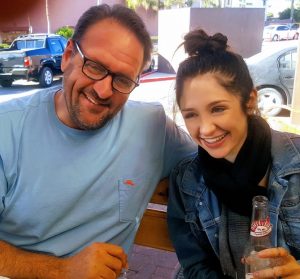
In Mexico, with my daughter. About as good as it gets.
Listening to: My favorite bands tend to be from the decade of the 1970’s. I grew up in the 1980’s but never really connected with that time period musically. Among the favorites of favorite, if I had to listen to one playlist for the rest of my life, stranded on a deserted island, it would have to be Pink Floyd. I got a chance to see them and spend time in their hotel room during the Division Bell tour in Phoenix in the early 1990’s. Check out a cool new website, Sutori and their anthology of Pink Floyd. Follow me on Spotify for an eclectic mix of musical playlists, especially ‘Joe Can’t Get Enough‘.
Watching: I despise reality TV. I enjoy the new medium of the long form, binge-worthy, series that have been prevalent on various cable outlets. Homeland and House of Cards continue to weave real-world political storylines into a very intriguing plot line. If I’m not into a series, I’m always looking for a great documentary. Many of the best I’ve shared in this post.
Podcasts: If you haven’t stumbled into the world of podcasts yet, I highly recommend you do. Get the free app, Stitcher, set up themed playlists and sample as many different shows as you can. I go in waves of shows that I follow and devour. After 7 years on live radio, every morning, I start to appreciate and understand what makes a good show. I’m particularly drawn to great interviewers. The art and talent of a great interviewer are something to admire.
Here’s a few I’m listening too right now:
Entrepreneurial Thought Leaders – Stanford U
Here’s The Thing – Alec Baldwin
Story Corp – NPR
EdSurge On Air
Conversations with Tyler
EconTalk
Revisionist History – Malcolm Gladwell
The Art of Manliness
Hidden Brain – NPR
On Being – Krista Tippett
TED Radio Hour
London School of Economics
Harvard Business Review – Ideacast
Freakonomics
Tim Ferris Show
Ken Rudin’s Political Junkie
Banter: AEI Podcast
Exchanges at Goldman Sach
Rich Dad Poor Dad
Power Of Ideas Throughout History – Deep Thoughts on the ‘WHY?’ of the Human Condition
The Power Of Ideas
Over the course of history, great thought leaders have taken a moment to lay out their ideas. Ideas have changed the world. From Adam Smith and the birth of capitalism to Lenin and the birth of communism, the power of ideas has improved societies and or plunged millions of lives into pain, strife or death.
This blog post is an outline of the thinkers and philosophers that have spoken to me. I tend to align with the Stoic thinkers that have a belief that we are here to serve and sometimes the struggle makes us stronger. From Robert Greenleaf to Marcus Aurelius to Aristotle’s ‘Golden Mean’ to Rudyard Kipling’s ‘If’ poem, to Jesus, these great ideas have shaped Western culture and my life.
I try to chronical the big thinkers that I can identify with, and share a summary of their life’s work and impact on society.
In the end, you can tie up my philosophical beliefs from the major thinkers that I chronical below. If you don’t want to read and listen to all the different topics, just watch the reading of Rudyard Kipling’s poem – IF – and you’ll know where I stand;
Aristotle – Golden Mean
Moral behavior is the mean between two extremes – at one end is excess, at the other deficiency. Find a moderate position between those two extremes, and you will be acting morally. If you think about it, Aristotle was thinking about what it means to be a human almost 2000 years ago. Plato, Confucious, Aristotle all lived within 100 years of each other. What was going on during that period whereby people had to time to create some of the biggest thoughts of all times? My theory is that in times when things are good, people have time to move from ‘how do we eat today’ to why are we here. Other times in history bare out this theory. The Dark Ages that lead to the Rennaissance is one of the times that comes to mind.
Aristotle, and most of the big thinkers I’m drawn to try to define the role of virtues and ethics and how they lead to happiness.
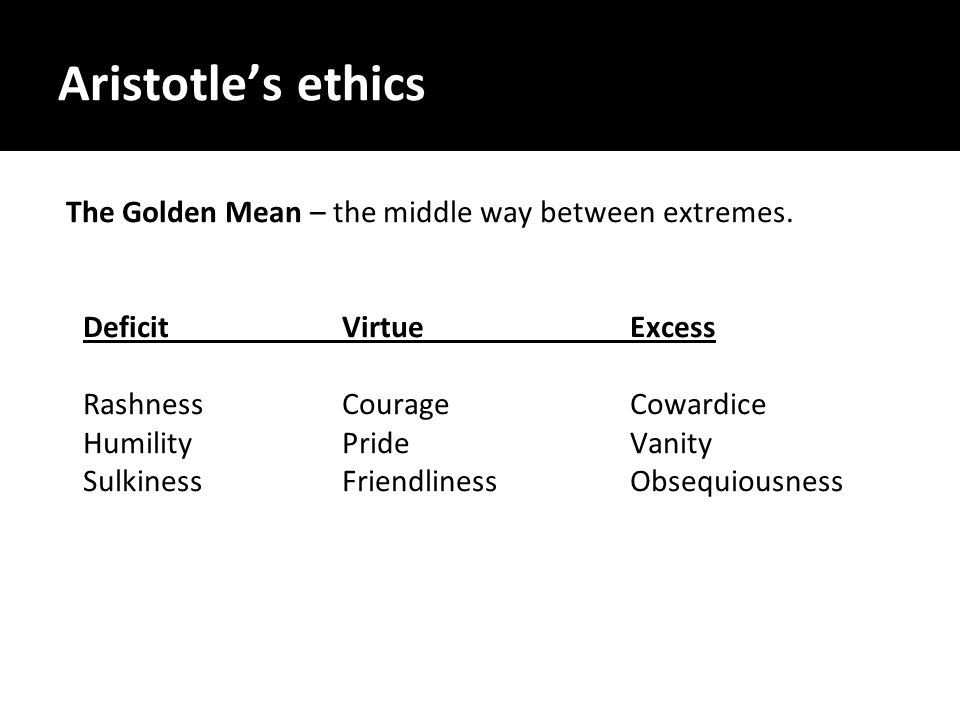
In a nutshell…..this is Aristotle
Marcus Aurelius – Defining Stoic Philosophy:
I’m reading through the mediations of Marcus Aurelius. What I’ve learned is that after 2000 years, men and countries are facing the same issues today as they did several thousands of years ago. General Mattis’ interview a the Hoover Institute puts it all in perspective. (HERE). Aurelius ruled Rome after Julius Ceaser, which I didn’t know, and during early Christianity. He came to power in 160 A.D. at the age of 39. He was groomed and trained from birth to rule. He believed in the Stoic Philosophers which was a 450-year-old line of philosophy that was founded by Zeon and honed by Seneca and Epicurious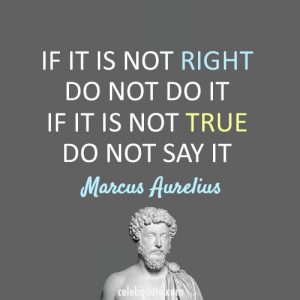
Way before Marcus, around 380 B.C., Plato wrote of an idea in which the greatest possible form of government is “one in which philosophers rule”. Marcus would eventually become the embodiment of Plato’s idea.
He demanded of himself 3 things:
- Noble action
- Good thought
- Strong character
The above Stoic traits defined Marcus Aurelius and led him to become the beloved and successful Emperor that he is still known as today.
The Stoics impacted history! In The Theory of Moral Sentiments, Smith referred to Marcus Aurelius as “the mild, the humane, the benevolent Antoninus,” demonstrating his deep admiration for the Stoic emperor. Marcus Aurelius influenced Adam Smith in three main areas: the idea of an inner conscience; the importance of self-control; and in his famous analogy of the “Invisible Hand.”
Both Marcus Aurelius and Adam Smith believed that the key to understanding morality was through self-scrutiny and sympathy for others.
Marcus Aurelius wrote Meditations in the form of a self-reflective dialogue with his inner self. He thought that moral conviction lay within “the very god that is seated in you, bringing your impulses under its control, scrutinizing your thoughts.’’ He interchangeably referred to this inner god as the soul or the helmsman and believed that it is a voice within you that attempts to sway you from immoral doings; we now call this a conscience.
Similarly, Smith emphasized the role of people’s innermost thoughts. A key aspect of Smith’s moral philosophy in The Theory of Moral Sentiments is the impartial spectator. Smith theorized that morality could be understood through the medium of sympathy. He thought that before people acted they ought to look for the approval of an impartial spectator.
“But though man has… been rendered the immediate judge of mankind, he has been rendered so only in the first instance; and an appeal lies from his sentence to a much higher tribunal, to the tribunal of their own consciences, to that of the supposed impartial and well-informed spectator, to that of the man within the breast, the great judge and arbiter of their conduct.”
The Importance Of Self-Control
The Stoics listed four “cardinal virtues” — wisdom, justice, courage, and temperance — for which they held great reverence. These were believed to be expressions and manifestations of a single indivisible virtue. Smith used slightly different names, but he endorsed the same set of virtues and the idea that they were all facets of one indivisible virtue.
Smith and Aurelius had a mutual appreciation for the virtue of self-control. They both believed in an impartial, self-scrutinizing conscience that guided morality: while Aurelius called it the God Within, Smith called it the Impartial Spectator.
Marcus Aurelius said, “You have power over your mind — not outside events. Realize this, and you will find strength.”The primacy of self-control is intrinsic to the Stoic philosophy. In a similar vein of thought, Smith writes that “self-command is not only itself a great virtue, but from all other virtues seem to derive their principal lustre.” This respect for self-control was encouraged and cultivated by Smith’s Impartial Spectator and Marcus Aurelius’ Inner God.
Marcus reframed his mindset to…..
- “I’m going to do my best everyday, my effort is always in my control”
- “If I meet any failure, I’ll know I gave it all I had and get better from it”
- “I will make mistakes. I am just a human, as was every emperor before me”
The First Reading of Marcus Aurelius (AoM)
1. Every Man Has a Primary Battle
Marcus Aurelius was a warrior, emperor, father, and husband. As a child, he lost his father when he was just a few years old, and as was common practice for aristocratic families of that era, Marcus was raised largely by mentors, nurses (nannies), and grandparents. When Aurelius became a father himself, he endured the deaths of eight children. All of that leads to the main themes that can be found in Meditations. You’ll see the same topics come up again and again and again.
Why does Aurelius write so much about death? Because he was surrounded by it — his family, his soldiers, his friends. Why does he write so much about not letting other people’s bad actions and attitudes affect you? As an emperor, he was dealing with greedy politicians day in and day out, as well as naysaying citizens. His Stoicism was a remarkably practical philosophy centered on simply surviving and staying sane in his world.
2. Every Man Should Take Lessons from Everyone Around Him
Our modern culture, however, has forgotten this ancient lesson. A moral failing by a modern business person, celebrity, politician, or even a company sparks internet outrage and calls for boycotts. Behaviors of historical figures now judged to be offensive, even if common to the time in which the men lived, are enough to write off all of their other admirable virtues and worthy accomplishments.
We don’t write ourselves off despite our flaws. Likewise, the wisest of men know that every person is a mosaic of virtue and vice, and that wisdom can be found in everyone, if only you’re willing to look.
3. Fate Plays a Role in Every Man’s Life — You Can Either Fight It or Accept It
“To the gods I am indebted for having good grandfathers, good parents, a good sister, good teachers, good associates, good kinsmen and friends, nearly everything good.”
“For all these [blessings in my life] require the help of the gods and fortune.”
best 25+ marcus aurelius quotes ideas only on pinterest | another on Marcus Aurelius Quotes Happiness – Broxtern Wallpaper and Pictures Collection
4. A Man is Not to Be Consumed by the Actions and Attitudes of Others
“When you wake up in the morning, tell yourself: The people I deal with today will be meddling, ungrateful, arrogant, dishonest, jealous and surly. . . . none of them can hurt me.”
“Don’t waste the rest of your time here worrying about other people . . . It will keep you from doing anything useful.”
5. Strenuous Action is the Answer
“When thou hast trouble in getting up, say to thyself: I awake to do the work of a man; why then should I grieve for having to do the things for which I was sent into the world? Was I born to remain warmly in bed under my covers? But it is so pleasant. Wert thou born for pleasure, then? Was it not for action, for work?”
“On the occasion of every act ask yourself . . . Will I regret it?”
“Why were you born? For pleasure? See if that answer will stand up to questioning.”
6. A Man Should Think, Do, and Be Good
As Aurelius advises, “inquire of yourself as soon as you wake from sleep.” Start every morning by getting in a mindset where you’re prepared to look for opportunities to serve and be useful. Benjamin Franklin practiced this, asking himself every morning “What good shall I do this day?” Then, at the end of the day, review your actions and inquire of yourself, as he did, “What good have I done today?” By bookending your day with a meditation on goodness, you will orient your soul more and more towards virtue.
Make your art that of being good. Do not simply think on it or talk about it; do good.
Stoic Philosophy
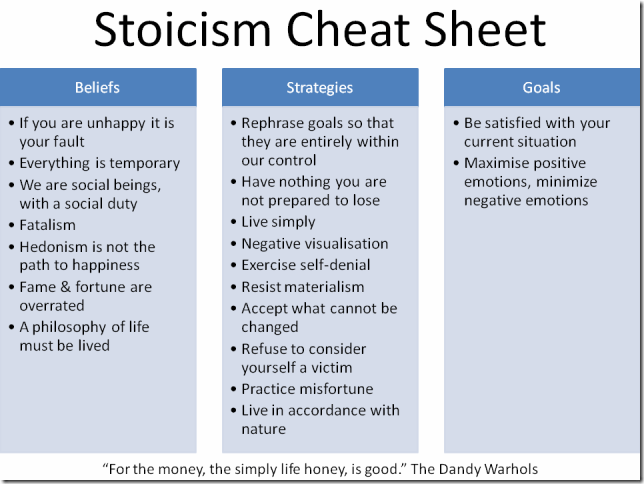
Marcus Aurelius comes from the Stoic line of philosophy. Started by Zeon around 335 BC, there is a few famous practitioners leading up to Aurelius’ time in 165 AD. Here’s some of the quotes that speak to me from three of the better know Stoics.
These will give you a sense of what their philosophy is all about.
| Marcus Aurelius |
| “How ridiculous and how strange to be surprised at anything that happens in life!” |
| Very little is needed for a happy life, it is within yourself; in your thinking |
| You have power over your mind, not outside events. Realize this and you shall have strength |
| Today I shall be meeting with interference, ingratitude, insolence, disloyalty, ill-will, and selfishness – all of them due to the offenders’ ignorance of what is good or evil.” |
| Waste no more time arguing what a good man should be, be one. |
| “Man is disturbed not by things, but by the views he takes of them.” |
| Each day provides it’s own gifts |
| “Everything, a horse, a vine, is created for some duty. Man’s true delight is to do the things he was made for.” |
| The art of living is more like wrestling than dancing |
| Do every act in your life, as if it were your last |
| The first step: Don’t be anxious. Nature controls it all. |
| Today I escaped anxiety. Or no, I discarded it, because it was within me, in my own perceptions – not outside. |
| The best answer to anger is silence. |
| The more we value things outside our control, the less control we have. |
| You’re subject to sorrow, fear, jealousy, anger and inconsistency. That’s the real reason you should admit that you are not wise. |
| A man when he has done a good act, does not call out for others to come and see, but he goes on to another act, as a vine goes on to produce again the grapes in season. |
| Receive without pride, let go without attachment. |
| Receive wealth or prosperity without arrogance; and be ready to let it go. |
| Let not your mind run on what you lack as much as on what you have already. |
| If it is not right do not do it; if it is not true do not say it. |
| So I look for the best and am prepared for the opposite. |
| When you arise in the morning, think of what a precious privilege it is to be alive – to breathe, to think, to enjoy, to love. |
| It is not death that a man should fear, but he should fear never beginning to live. |
| Dwell on the beauty of life. Watch the stars, and see yourself running with them. |
| No man can escape his destiny, the next inquiry being how he may best live the time that he has to live. |
Don’t set your mind on things you don’t possess as if they were yours, but count the blessings you actually possess and think how much you would desire them if they weren’t already yours. – Marcus Aurelius, Meditations, 7.27
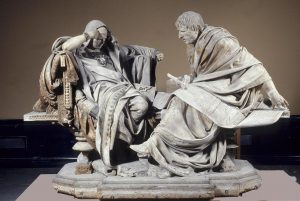
Seneca advises Emperor Nero. Nero and Caligula were two of the harsh rulers of the Roman Empire that went down in history on how not to lead.
| Seneca |
| It is a rough road that leads to the height of greatness |
| Wherever there is a human being there is an opportunity for kindness |
| Luck is preparation meeting opportunity |
| The most powerful is he who has himself in his own power |
| The greatest remedy for anger is delay |
| The first step in a persons salvation is knowing his sin |
| The less we deserve good fortune, the more we hope for it. |
| The bravest sight in the world is to see a great man struggling with adversity |
| For many men, the acquisition of wealth doesn’t end their troubles, it only changes them |
| The mind that is anxious about the future in miserable |
| You learn to know a pilot in a storm |
| Punishment to some, to some a gift, to many a favor |
| The heart is great, which shows moderation in prosperity |
| A man is as miserable as he thinks he is |
| Do everything, as in the eye of another |
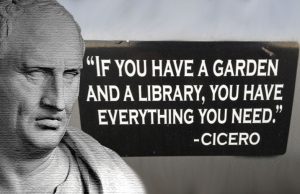 |
| Cicero (borrowed from and aligned with Stoic philosophy) |
| Gratitude is not only the greatest virtue but the parent of all others |
| Silence is one of the great arts of conversation |
| If you have a garden and a library you have everything you need |
| The higher we are placed, the more humbly we should walk |
| The wise are instructed by reason, average minds by experience, the stupid by necessity and the brute by instinct |
| Never go to excess but let moderation be your guide |
| Before beginning, plan carefully |
| The greater the difficulty the greater the glory |
| A man of courage is also full of faith |
| Rashness belongs to youth, prudence to old age |
| I never admire another’s fortune, so much that I become dissatisfied with mine |
| Honor is the reward of virtue |
| Ability without honor is useless |
| We forget our pleasures, we remember our struggles |
Morgan Freeman recites ‘Invictus’
Benjamin Franklin
We’ve all learned about Ben Franklin and the kite with the key, but if you put Franklin’s life as a total in perspective you start to see how truly amazing he was. First, he was an inventor and entrepreneur. A statesman and community leader. The part that jumps at me was his impact on Revolutionary America. If you look at history, Revolutions are lead and sparked by the young. Ben was 70, clearly the odd man out. Sam Adams was 53, George Washington 45, John Adams 40, William Penn 35, Thomas Jefferson 33 and Alexander Hamilton was 21. When Ben joined the revolutionary cause to declare independence from the most powerful nation on earth, England, he had a lot to lose. The lending of his name to the effort was a huge turning point in getting the colonies on board to form a new country.
FEE – Franklin, more than anybody, linked the emerging international movements for liberty. James Madison recalled that he never passed half an hour in his company without hearing some observation or anecdote worth remembering. Franklin dined with Wealth of Nations author Adam Smith. The Scottish philosopher David Hume told Franklin: America has sent us many good things, Gold, Silver, Sugar, Tobacco, Indigo . . . . But you are the first Philosopher, and indeed the first Great Man of Letters for whom we are beholden. Edmund Burke, who had opposed Britain’s war against America, called Franklin the friend of mankind. When the French wit Voltaire met William Temple Franklin, he quipped: God and Liberty! It is the only benediction which can be given to the grandson of Franklin. Laissez-faire economist Anne Robert Jacques Turgot remarked that Franklin snatched the lightning from heaven and the scepter from tyrants.
Franklin was a late-blooming radical. During his 30s, he brokered the sale of some slaves as a sideline for his general store. He and his wife owned two slaves. In 1758, when he was 52, he suggested establishing Philadelphia’s first school for blacks. He abandoned his support for the British Empire and committed himself to the American Revolution when he was 70. Philadelphia Quakers had launched the abolitionist movement by organizing the Pennsylvania Society for Promoting the Abolition of Slavery (1775), but its activities ceased during the Revolution; this pioneering society revived in 1787 when Franklin became its president, at 81. Two years later he voiced his support for the ideals of the French Revolution.
Franklin was famous for his charm and tact, which enabled him to get the most out of people, but he had detractors. For instance, John Adams complained that I could never obtain the favour of his Company in a Morning before Breakfast which would have been the most convenient time to read over the Letters and papers. . . . Mr. Franklin kept a horn book always in his Pockett in which he minuted all his invitations to dinner, and Mr. [Arthur] Lee said it was the only thing in which he was punctual . . . and after that went sometimes to the Play, sometimes to the Philosophers but most commonly to visit those Ladies. . . . John Dickinson, head of Pennsylvania’s delegation to Congress, hated Franklin so much that he refused to install a lightning rod on his Philadelphia mansion—and it was struck by lightning.
Practical Wisdom
A person will have all the moral virtues and Sophia, or a grasp of eternal truths. Have you ever met someone that always seems to have the right answers, or more importantly knows how to ask the right questions at the right moments? These people are sought out when you need advice. They seem to know how to read emotions better than others. A person with practical wisdom knows the rules but knows when and how to bend them when it’s the right thing to do. The person who has better practical wisdom tends to anticipate the future.
Practical wisdom….. I don’t know how to define it, but I know it when is see it.
Hume
Adam Smith
John Locke
Jonathan Haidt
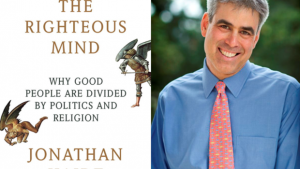 Jonathan Haidt is looking closely at society and how things evolve. Jonathan David Haidt is an American social psychologist and Professor of Ethical Leadership at New York University’s Stern School of Business. His academic specialization is the psychology of morality and the moral emotions. Jonathan’s book, The Righteous Mind, is a fascinating read on the why’s, how’s and what’s of human morality. Morality you ask? How boring! Well at the root of all things on earth, at the intersection of all events in history, at the rise and fall of all civilizations, in your daily interactions with your family or at work, morality, and how we as people process our world is the root of everything.
Jonathan Haidt is looking closely at society and how things evolve. Jonathan David Haidt is an American social psychologist and Professor of Ethical Leadership at New York University’s Stern School of Business. His academic specialization is the psychology of morality and the moral emotions. Jonathan’s book, The Righteous Mind, is a fascinating read on the why’s, how’s and what’s of human morality. Morality you ask? How boring! Well at the root of all things on earth, at the intersection of all events in history, at the rise and fall of all civilizations, in your daily interactions with your family or at work, morality, and how we as people process our world is the root of everything.
Haidt weaves a theory that is well argued that there are 6 pillars which create the human moral compass. He looks anthropologically to prove the point that humans are social beings, we use our moral tools to get along and thrive in groups.
The Five Foundations
1. The Care/Harm Foundation
This foundation makes us sensitive to signs of suffering and need. In order to maximize care and minimize harm, we enact laws that protect the vulnerable. We punish people who are cruel and we care for those in suffering.
2. The Fairness/Cheating Foundation
This foundation leads us to seek out people who will be good collaborators in whatever project we are pursuing. It also leads us to punish people who cheat the system. People on both the right and the left believe in fairness, but they apply this foundation in different ways. Haidt explains:
“On the left, fairness often implies equality, but on the right it means proportionality – people should be rewarded in proportion to what they contribute, even if that guarantees unequal outcomes” (161).
3. The Loyalty/Betrayal Foundation
All of us, whether on the right or left, are “tribal” in some sense. We love the people on our team, and loyalty makes our team more powerful and less susceptible to our failure. Likewise, we have a corresponding hatred for traitors. Those who betray our “team” for the other side are worse than those who were already on the other side.
Though Haidt sees both left and right as being tribal, he recognizes “the left tends toward universalism and away from nationalism, so it often has trouble connecting to voters who rely on the Loyalty foundation” (164).
4. The Authority/Subversion Foundation
Authority plays a role in our moral considerations because it protects order and fends off chaos. Haidt explains:
“Everyone has a stake in supporting the existing order and in holding people accountable for fulfilling the obligations of their station” (168).
5. The Sanctity/Degradation Foundation
No matter the era, humans have always considered certain things “untouchable” for being dirty and polluted. The flipside is that we want to protect whatever is hallowed and sacred, whether objects, ideals, or institutions.
People on the right talk about the sanctity of life and marriage. People on the left may mock purity rings.
6. The Liberty/Oppression Foundation
This foundation builds on Authority/Subversion because we all recognize there is such a thing as legitimate authority, but we don’t want authoritarians crossing the line into tyranny. Both the left and the right hate oppression and desire liberty, but for different reasons.
The left wants liberty for the underdogs and victims (coinciding with their emphasis on Fairness/Cheating). The right wants liberty from government intrusion.
He digs into great thinkers like Plato and Hume who intuitively put forth arguments as to who’s in control in our minds, the urge driven ego or the rational moral compass. Haidt, like Gladwell and Duckworth (below), uses research studies and cross discipline analysis to prove, probably the most important point of all, which is ‘what makes people tick?’ His use of analogies like the real motivations in people are the large elephant and the part that controls our impulses and urges is the nimble rider help illustrate that to changes someone’s mind and belief system, you can’t appeal to the rider, you must get the elephant to WANT to change. Haidt references my favorite book of all time, How To Win Friends and Influence People by Dale Carnegie. The Righteous Mind is a great read if you want to get to the root of the ‘why’ of human nature.
Haidt sums up his morality as an evolutionary tool theory:
Koch Brothers
Freakonomics – (on history and philosophy of what motivates man)
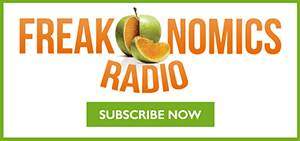 The power of money and ideas – This interview explains Charles Koch’s move from business to the business of funding of ideas. Listen to his move from scholarships to professors to think tanks to state and national politics. This story is about the power of ideas to change the world. Q: “Why do you care so personally about shaping the history of mankind?” About 24:00 in, Koch explains his motivations.
The power of money and ideas – This interview explains Charles Koch’s move from business to the business of funding of ideas. Listen to his move from scholarships to professors to think tanks to state and national politics. This story is about the power of ideas to change the world. Q: “Why do you care so personally about shaping the history of mankind?” About 24:00 in, Koch explains his motivations.
Part 2
Charles Koch argues that the biggest threats to America these days are special interests, cronyism, and corporate welfare. Which may seem strange if you think of a corporate CEO, like Koch, as a beneficiary of those things. He also argues that our political system has turned into a dumpster fire, with both parties guilty of rent-seeking and putting their thumbs on whatever scales they can find. Which may also strike you as strange, if you consider that what a political network like the Koch Brothers’ network does is — well, puts its thumb on the scale. Because he primarily funds Republicans, and because so much of that funding is “dark,” anonymous money, he is seen by most Democrats as something close to the devil — even though some of his positions, as you’ll hear today, align quite snugly with traditional liberal positions.
My overall impression from speaking with him? Charles Koch believes he’s fighting the good fight based on proven principles — and that the rest of America has been going mad, bit by bit.
On Business:
EntreLeadership (on business)- HERE
St. Agustine
‘Better than to have loved and lost, than never to have loved before’

Jordan B Peterson – 12 Rules for Life –
Here’s a few of my favorite Art of Manliness episodes:
Tyler Cowen, one of my favorite economists. The Complacent Class
Honor, Courage and Themos, Plato’s Ideas of Manliness – Angela Hobbs
Make Your Bed Change The World – Navy Seal – Admiral William McCraven – First saw McCraven at the UT Commencement Address
Ancient Honor – Dr. Barton
What Ancient Greeks and Romans Thought About Manliness – Ted Landen
The Road to Character – David Brooks – I bought the book after this interview.
The Untold Story of Jimmy Stewart in WWII – Robert Matzen – A man at the top of the world …… turns to service. Great story!
The Case for Blue Collar Work – Mike Rowe – HERE
Ben Sasse – on Society and Culture – HERE
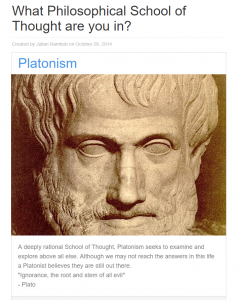
Some thought leaders that I really have been intrigued by are Malcolm Gladwell, Angela Duckworth and Tim Ferriss. They’ve made observations and studies of people and society on a micro and macro level. Each of these authors and thinkers has a body of work on how to destruct what makes some people succeed while other people, who seem to have it all, fail. Here are a few of my favorite lectures by these people:
https://youtu.be/iNiJEsb1PMw
HERE with Pastor Rick Warren.
Angela Duckworth- GRIT and Perseverance! Ever wonder why friends or family members that have it all, money, looks, smarts and opportunity yet struggle at life? The missing ingredient needed is GRIT. Duckworth does a deep analysis of the science and psychology behind success. Get the book and devour it. Freakonomics covered a super bold project that Duckworth is proposing, check out the interview….Could Solving This One Problem Solve All Others?
Tim Ferriss and his first book, 4 Hour Work Week, started out his journey on figuring out the hacks that make great people great. From sports to money to cooking to military figures, Tim interviews and dissects the best of the best. Start with Tools For Titans and subscribe to his podcast.
THIS article from Inside Business is a great starting point to learn all things, Tim. Here’s what jumped out at me:
1. There are two parts to self-improvement
Oftentimes we see self-improvement merely as goal achievement. However, Tim realized that achievement is only 50% of it. He says, “The other 50% is gratitude and appreciating what you already have, not focusing solely on future accomplishments.” There are so many highly successful people who are never satisfied with what they’ve accomplished and it’s unfortunate.
As Tim mentioned, “They’ve conquered every mountain, slayed every dragon and they’re still not happy”. Don’t be one of those people! If you want to have any sense of well-being, you have to show appreciation for what you already have.
2. Improve two areas of your life at a time
For those of us who are Type A personalities, we tend to be super ambitious and self-critical as we’re always trying to improve our lives. Over the last 10 years Tim realized that “too much optimizing can be self-destructive.” Like with many things in life, things in excess tend to take on the characteristics of their opposites. So in this case, the sole focus on self-improvement can be misguided and can lead to depression and anxiety.
6. Focus on developing skills and relationships
When making important decisions and capping the downside, potential risks or mistakes, Tim focuses on two things: skills and relationships. The question he asks himself is, “Even if this fails, are there skills and relationships that I can develop that will carry over into other things?” Tim’s philosophy is that, “Failure isn’t failure if you can gain new skills and develop relationships for future advancement.”
7. It’s important to diversify your identity
When you’re passionate about your work, it’s easy to have everything vested in your business which can serve you well in most cases. However, Tim says that “100% dedication can lead to a disaster in the sense that you have all of your psychological eggs in one basket.”
10. Fame, power, money and alcohol just make you more of who you already are
Tim knows a lot of successful people who are worth hundreds of millions of dollars. One thing he’s learned is that fame, power, money, and alcohol just make you more of who you already are.
He explained, “So if you’re neurotic, add 100 million to that, you’ll be super neurotic!” If you’re generous, add 100 million to that, you’ll be even more generous. Essentially your characteristic just get exaggerated when you add those things in life. So it’s important that you work on who you want to be before you get those things.
Here’s a long form interview with Tony Robbins and Tim Ferriss. I remember listening to Tony Robbins cassette tapes in college and graduated to his CD’s. To hear the two together is pretty cool.
Want to dig into Social Psychology? Start with Canadian, Dr. Jordon Peterson – HERE – He weighs in on safe spaces and political correctness. My favorite in #1…be grateful!
Talk Radio Guy Reflects – Sounds Familiar
I got to say that when the latest Krista Tippett podcast interview featuring Glenn Beck came on I immediately thought ….nope, can’t do it. After listening I have to say his journey and his summation of where we are as a country is a spot on. Like Beck, I spent years on the air in conservative talk radio. Day in and day out for 7 years I devoured every bit of news, followed the story of the day, spun, entertained and started to see patterns. Like Glenn, the intense journey of a daily radio show can really change a person. The very nature of talk radio is focusing on the negative. I started my media career at the election of Barack Obama. During his entire presidency, I had a ringside seat. About 6 years in, I started to see these major patterns that really started to paint a dark picture on the future of our society. I compiled the patterns and am in the process of putting the concepts into a book. The book intro is open to view on this blog – HERE. In this interview, Beck opens up, sees his role as fear mongering entertainer and the damage he’d done to the country. Like Beck, after the craft of interviewing is perfected, once you a covered the outrage of the day for the 1000th time after the ego has been built up and the adorations have been logged you start to look at your role as a thought leader. You start to realize that you are now part of the problem and ultimately part of the solution. I tuned out from Beck because to me he was entertainment and I’m hungry for knowledge and explanations. After this interview, his vulnerability and his realization of his mistakes came across loud and clear. Today I bought one of his recent books and I’m going to start listening again. His journey is my journey and I really really get where he’s coming from. Glenn Beck and Samantha Bee – HERE
This one spoke to me, I included the truths that I identify with but encourage you to read the entire article (HERE):
19 Great Truths My Grandmother Told Me on Her 90th Birthday
“I have seen and touched and danced and sang and climbed and loved and meditated on a lifetime spent living honestly. Should it all end tonight, I can positively say there would be no regrets. I feel fortunate to have walked 90 years in my shoes. I am truly lucky. I really have lived 1,000 times over.”
- There are thousands of people who live their entire lives on the default settings, never realizing they can customize everything. – Don’t settle for the default settings in life. Find your loves, your talents, your passions, and embrace them. Don’t hide behind other people’s decisions. Don’t let others tell you what you want. Design YOUR journey every step of the way! The life you create from doing something that moves you is far better than the life you get from sitting around wishing you were doing it.
- The right journey is the ultimate destination. – The most prolific and beneficial experience in life is not in actually achieving something you want, but in seeking it. It’s the journey towards an endless horizon that matters—goals and dreams that move forward with you as you chase them. It’s all about meaningful pursuits—the “moving”—and what you learn along the way. Truly, the most important reason for moving from one place to another is to see what’s in between. In between is where passions are realized, love is found, strength is gained, and priceless life-long memories are made.
- The willingness to do hard things opens great windows of opportunity. – One of the most important abilities you can develop in life is the willingness to accept and grow through times of difficulty and discomfort. Because the best things are often hard to come by, at least initially. And if you shy away from difficulty and discomfort, you’ll miss out on them entirely. Mastering a new skill is hard. Building a business is hard. Writing a book is hard. A marriage is hard. Parenting is hard. Staying healthy is hard. But all are amazing and worth every bit of effort you can muster. Realize this now. If you get good at doing hard things, you can do almost anything you put your mind to.
- No one wins a game of chess, or the game of life, by only moving forward. – Sometimes you have to move backward to put yourself in a position to win. Because sometimes, when it feels like you’re running into one dead end after another, it’s actually a sign that you’re not on the right path. Maybe you were meant to hang a left back when you took a right, and that’s perfectly fine. Life gradually teaches us that U-turns are allowed. So turn around when you must! There’s a big difference between giving up and starting over in the right direction.
- Our character is often most evident at our highs and lows. – Be humble at the mountaintops, be strong in the valleys, and be faithful in between. And on particularly hard days when you feel that you can’t endure, remind yourself that your track record for getting through hard days is 100% so far.
- Life changes from moment to moment, and so can you. – When hard times hit there’s a tendency to extrapolate and assume the future holds more of the same. For some strange reason, this doesn’t happen as much when things are going well.
- You can fight and win the battles of today, only. – No matter what’s happening, you can resourcefully fight the battles of just one day. It’s only when you add the battles of those two mind-bending eternities, yesterday and tomorrow, that life gets overwhelmingly difficult and complicated.
- Solitude is important, too. – Speaking to someone can help, but in moderation. Sometimes the moments you feel lonely are the moments you may most need to be by yourself. This is one of life’s cruelest ironies. We need solitude because when we’re alone we’re detached from obligations, we don’t need to put on a show, and we can hear our own thoughts and feel what our intuition is telling us. And the truth is, throughout your life there will be times when the world gets real quiet and the only thing left is the beat of your own heart. So you’d better learn the sound of it, otherwise, you’ll never understand what it’s telling you.
- Beginning each day with love, grace and gratitude always feels better than the alternative.
- Most of the time you don’t need more to be happier—you need less. – When things aren’t adding up in your life, begin subtracting. Life gets a lot simpler and more enjoyable when you clear the emotional and physical clutter that makes it unnecessarily complicated. (Angel and I guide our readers through this process of simplifying and getting back to happy in our brand new book.)
- Who we choose to be around matters immensely. – Spend time with nice people who are smart, driven and likeminded.
- It’s during the toughest times of your life that you’ll get to see the true colors of the people who say they care about you. – Notice who sticks around and who doesn’t, and be grateful to those who leave you, for they have given you the room to grow in the space they abandoned, and the awareness to appreciate the people who loved you when you didn’t feel lovable.
- New opportunities are always out there waiting for you. – Nobody gets through life without losing someone they love, something they need, or something they thought was meant to be. But it is these very losses that make us stronger and eventually move us toward future opportunities. Embrace these opportunities.
A book review from University Bookman of the book by Fran O’Rourke Aristotelian Interpretations –
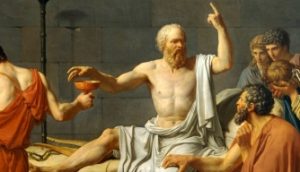 Aristotle on Why Things Are;
Aristotle on Why Things Are;
Aristotle is himself a liberal education. He is the one who best explains to us why we seek to know things “for their own sake,” why we need to know the order of things. No one, even to this day, works his way as carefully through the whole range of reality as carefully and clearly as does Aristotle. And when other thinkers come close, it is usually because they are themselves first readers of Aristotle. To read Aristotle is to begin to know how things are. And to know how and why things are is to be educated liberally.
Self Awareness – Morality – Self Destiny;
I was particularly struck by O’Rourke’s awareness that the drama of existence itself is what is played out in each of our human lives. The existence of millions and billions of human beings on this planet is not actualized in some collective form or ideal. It is actualized in each existing human being.
Though we exist as individual persons, because of our knowledge and our power to act on account of it, we are not deprived of the rest of the world.
Individual First, Fitting Into The World Second;
“We do not have simply a vague desire for the fact of being,” O’Rourke writes. “Our happiness derives from the awareness of our own life as good; each man’s existence is desirable for himself.… Self-awareness is a certainty; it is concomitant self-awareness of ourselves in our knowing the world and as agents within the world” (86). Though we exist as individual persons, because of our knowledge and our power to act on account of it, we are not deprived of the rest of the world. Through knowing, we can become what is not ourselves without changing what is not ourselves. This fact is basically why it is all right to be a single, relatively insignificant human being. We desire our own existence, but this existence opens out onto all that is wherein we self-actualize ourselves in terms of our chosen relation to the good that is there and that we come to know, to accept or reject.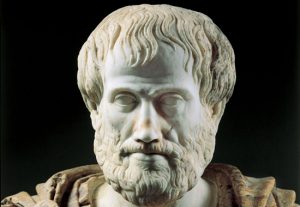
On Politics – The Pinnacle of Man
When politics has come to be what it ought to be, it turns us finally not to the practical life of this world but indirectly to the contemplative life, to our wonder about what it is all about and how to articulate what we can know about the highest things, even if, as Aristotle also said in the last book of the Ethics, it is small in comparison to other, more visible practical things. “There is ambivalence at the heart of wonder. It is not simply the absence of knowledge, but a knowledge that there is something beyond its reach. This finds its explanation in Aristotle’s distinction between what is intelligible in itself and what is evident to us” (32). We realize that we are limited beings with a power of mind that is capax omnium, capable of knowing all that is. Thus we must grant that “the intelligibility of the real far exceeds our understanding.” It is this realization that is no doubt the primary natural reason why something like a divine revelation might just be both possible and even actual.[7] It also explains the “restless hearts” that we so readily associate with Augustine.
Because We Have Minds – We Have Choices
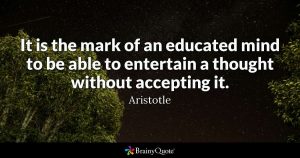 In conclusion, let me return to the two initial citations that are found at the beginning of these reflections. The first concerns the mind that is found in each member our kind. It is because we have minds that we can worry about, wonder about, what is out there, what is not ourselves. And we can not only pay attention to it, but we can see its diversity and its unities. But we know with our mind not only what is not ourselves, but also the possibility that we can change, reshape many things. We even suspect that we can and should use things that are just there through no contribution of our own. Indeed, it suggests that the uninhabited world was in fact meant to be inhabited. It was meant to provide a place for a being that knew and acted. In so doing, it revealed his soul.
In conclusion, let me return to the two initial citations that are found at the beginning of these reflections. The first concerns the mind that is found in each member our kind. It is because we have minds that we can worry about, wonder about, what is out there, what is not ourselves. And we can not only pay attention to it, but we can see its diversity and its unities. But we know with our mind not only what is not ourselves, but also the possibility that we can change, reshape many things. We even suspect that we can and should use things that are just there through no contribution of our own. Indeed, it suggests that the uninhabited world was in fact meant to be inhabited. It was meant to provide a place for a being that knew and acted. In so doing, it revealed his soul.
The Future – Deep Thoughts on the ‘WHY?’ of the Human Condition
The Future
Battery Technology
Major breakthroughs in battery technology will change the world as we know it. From electric cars to your cell phone, the limits of lithium-ion batteries have stalled out the ability to truly move away from the combustible engine. I’m watching closely for a major breakthrough in battery technology. This may be the first step:
It will still be a while before we see “holey” graphene batteries in real-world devices, said Duan, who calls this paper “a critical step, but just a starting point toward commercialization.” Looking ahead, he could easily see niobia-based batteries that charge up to five or 10 times faster than today’s lithium-ion cells. And batteries made with energy-dense materials like silicon could power laptops for 20 or 30 hours on a single charge, and triple the driving range of an electric vehicle.
“I think this really gives us a pathway toward using these high-performance materials in real-world devices,” Duan said.
Here’s one I’m watching –
Fisker patents radical ‘solid state battery’ it claims can power a car for 500 miles and recharge in a MINUTE
According to Fisker, the radical new battery would deliver 2.5 times the energy density of typical lithium ion batteries. Solid-state batteries are known to have a number of limitations, such as low power and low rate capability as a result of the layered electrode structure, and issues arising from cold temperatures, the firm explains.
But, the new technology attempts to overcome the challenges using a three-dimensional solid-state structure.This allows the electrodes to cover 25 times more surface area than flat thin-film designs.
‘This breakthrough marks the beginning of a new era in solid-state materials and manufacturing technologies,’ said Dr. Fabio Albano, VP of battery systems at Fisker Inc.
The TESLA power wall at $5500 (two needed to power a typical home) is pioneering a concept that over time will change the way we run our homes. I’m looking at an off the grid system that converts solar to home use and the current deep cycle battery technology costs a lot and has a number of sensitive variables that must be managed to make the systems run efficiently. We’ll look back one dat at this video and laugh at how complex it is to run the current systems:
The solar world is seeing prices drop and efficiency of conversion of solar power into usable electrical power. I was critical of the government incentives that were throwing money at consumer grade green energy. On the air, I lamented about foreign manufacturers pumping solar into the market just to absorb up the tax credits. What was the quality of their products? Basically, tax credits created an artificial market. I did qualify my critiques with the statements that this would all be worth it if major technology breakthroughs were created based on all the activity in the solar sector. It looks like that’s coming to pass. Solar technology is has grown by 20% in the past few years, but it’s the battery technology that is the most promising. TESLA has started the market of consumer-based energy storage but watch for others to come into this space and drive down pricing.
Here’s a few of the technologies being created right now that could change the storage world. HERE –
10 alternatives to lithium-ion batteries
Nuclear Power
The next technology has a lot of history and was once a movement that looked like it could change the way we power the earth…nuclear. America is way behind the nuclear power curve. With tech advancements and reuse of much of the waste we used to have to store, nuclear has real potential to change the globe. If you haven’t seen Pandora’s Promise you need to.
Inc Magazine 2025 advancements I think we’ll see come to fruition:
1. Dementia DeclinesOverall, this particular report places great faith in science’s ability to prevent disease by better understanding the human genome. One of the biggest boons from that improved understanding will be a reduction in degenerative disease such as dementia and Alzheimer’s. So far, researchers have been able to identify specific chromosomes that cause different forms of the dementia. The most oft-cited research since 2011 has been about a chromosome known as 9P, which has been linked to two forms of dementia.6. The internet of (every)thingsWe think we live in a connected world. A decade from now, we’ll wonder how we were ever so isolated. “Wireless communications will dominate everything, everywhere,” says the report. “Imagine the day when the entire continent of Africa is completely, digitally connected,” which it predicts will occur in 2025. All this will happen thanks to improved semiconductors, changes in 5G technology, and supercapacitors that will be able to store much more energy for later release than the current generation of capacitors.
8. The cure is no longer worse than the diseaseBy 2025, says the report, cancer patients will no longer have to choose between living with a fatal disease and enduring treatments that can quickly become intolerable. The pharmaceutical industry has been working toward a goal of personalized medicine, developing drugs that target specific molecules. As medical tools become more targeted, they’ll engage only the molecules necessary to combat the disease, sparing healthy ones and leading to treatments with far fewer negative side effects.
Raw Materials
Cobalt is a metal that few investors know much about – it is critical to the electric vehicle (EV) revolution because it makes up some 35% of the lithium-ion battery mix.
That’s 30% of batteries that are the backbone of EVs, EVs that are now mainstream. To meet the demand for EVs, billion-dollar battery Giga factories have been built and continue to be built. Consumer electronics are contributing to the demand and resulting shortage of supply.
And, unlike lithium, which is a fairly common commodity… we can’t source enough of cobalt as things stand today – and demand is increasing quickly.
Crypto Currency
I had a good friend try to explain to me what Bitcoin was and how it worked. I didn’t get it…..I get it now. Central banks are printing money like it’s going out of style. Since we left the gold standard, under Nixon (see above, why he’s my second least favorite President), there has been no intrinsic value behind the American Dollar. Basically, printed money gets its value based on confidence in the underlying government. Once the confidence that the government can and will do the right things erodes, so does the value of its currency. Assets like gold, land, raw materials will be wear value is stored as paper money become worthless. Crypto Currencies like Bitcoin are another form of wealth storage. In the hyper-debt environment, we find ourselves in globally a lot of wealth has been created. If you watch Bitcoin, you’ll see that it’s steadily been climbing as central banks keep printing. The latest run-up has been caused by Chinese investors desperately looking to get capital out of their economy. The Chinese government has clamped down on outflows to the foreign real estate (London, Toronto, New York, Hawaii have all seen a massive run-up from foreign investors), so Bitcoin is the new store of wealth.
Thorium Nuclear Power and Nuclear Alternatives
As energy becomes more and more expensive look for technological advances to leap the supply of energy forward. I’ve done a lot of research on Thorium Power and I can’t believe it hasn’t become part of our societal discussion. I can’t help but think that the disruptive nature to the economy has kept the technology sidelined.
Thorium Power Is the Safer Future of Nuclear Energy
Nuclear power has long been a contentious topic. It generates huge amounts of electricity with zero carbon emissions, and thus is held up as a solution to global energy woes. But it also entails several risks, including weapons development, meltdown, and the hazards of disposing of its waste products.
But those risks and benefits all pertain to a very specific kind of nuclear energy: nuclear fission of uranium or plutonium isotopes. There’s another kind of nuclear energy that’s been waiting in the wings for decades – and it may just demand a re-calibration of our thoughts on nuclear power.
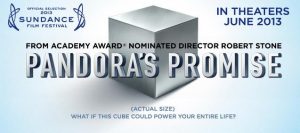 Speaking of alternative energy – still a big fan of nuclear – check out Pandora’s Promise. This documentary covers an environmental activist and writers mind shift from anti-nuke to pro-nuclear energy. If we want clean power at a low cost, nuclear is the answer.
Speaking of alternative energy – still a big fan of nuclear – check out Pandora’s Promise. This documentary covers an environmental activist and writers mind shift from anti-nuke to pro-nuclear energy. If we want clean power at a low cost, nuclear is the answer.
Combustible Engine Technology and Self-Driving Cars
The invention from Israeli-based Aquarius Engines is currently being discussed by France’s Peugeot, the firm said. Aquarius says the cost of the engine will be as low as $100 (92 euros). According to the firm, the engine can allow cars to travel more than 1,600 kilometres (990 miles) on a single tank of fuel, more than double current distances.
Such efficiency is vital as countries seek to reduce carbon dioxide emissions—a main cause of climate change. Car engines are a major source of CO2 emissions.
Read more at: https://phys.org/news/2016-10-israel-firm-super-efficient-power-car.html#jCp
Imagine a form of nuclear energy with greater output and virtually no safety issues.
Such is the promise of liquid fluoride thorium reactors (LFTRs), and we’ve had several past interviews with thorium expert Kirk Sorensen to discuss their potential:
 Much safer – No risk of environmental radiation contamination or plant explosion (e.g., Chernobyl, Fukushima, Three Mile Island)
Much safer – No risk of environmental radiation contamination or plant explosion (e.g., Chernobyl, Fukushima, Three Mile Island)- Much more efficient at producing energy – Over 90% of the input fuel would be tapped for energy, vs. <1% in today’s reactors
- Less waste-generating – Most of the radioactive by-products would take days/weeks to degrade to safe levels, vs. decades/centuries
- Much cheaper – Reactor footprints and infrastructure would be much smaller and could be constructed in modular fashion
- More plentiful – LFTR reactors do not need to be located next to large water supplies, as current plants do
- Less controversial – The byproducts of the thorium reaction are pretty useless for weaponization
- Longer-lived – Thorium
is much more plentiful than uranium and is treated as valueless today.
There is virtually no danger of running out of it given LFTR plant
efficiency
Finally, Thorium is getting it’s day. First major experiment in 45 years on a Thorium reaction is moving forward.
This unassuming material could change the future of electronics and engineering as we know it. Recent research has unearthed extraordinary properties, including graphene sheets being ten times tougher than steel and exceptionally effective electrical conductors. Amazingly, they are also transparent to visible light – meaning they can be used for conveying information between optical fibres. Although the theoretical study of graphene started in the 1950s, the experimental study of graphene had not been realized until the recent discovery and characterization of exfoliated graphene by Novoselov et al. (2004) and epitaxial graphene by Berger et al. (2004). Because of its fundamental importance in physics as a realization of a relativistic condensed-matter system (i.e. a non-quantum mechanical description of a system of particles), as well as its application potentials in next-generation electronics, research interest in graphene has been rising rapidly. Even though it might take a long time before graphene’s full application potentials can be fully realized, graphene is an incredibly intriguing system with a lot more to be explored.
I loved this break down from John Mauldin – Here’s his blog and the items that jumped out at me:
MAULDIN: 20 Positive Trends That Will Make You Feel Good About the World in 2018
I ran across a great list from the Future Crunch website recently: “99 Reasons 2017 Was a Great Year.” Here, I’ll list some of the best things that happened this year and add my own comments.
Breakthroughs in Medicine
- This year, the World Health Organization unveiled a new vaccine that’s cheap and effective enough to end cholera, one of humanity’s greatest-ever killers. New York Times
- Cancer deaths have dropped by 25% in the United States since 1991, saving more than two million lives. Breast cancer deaths have fallen by 39%, saving the lives of 322,600 women. Time
- And on November 17, WHOannounced that global deaths from tuberculosis have fallen by 37% since 2000, saving an estimated 53 million lives.
I’m bullish on all kinds of life-extension technologies. I really expect to live well beyond age 100 with all my faculties intact.
One by one, killer diseases like cholera are giving way to humanity’s fast-growing medical knowledge. Some of the greatest threats to human beings will be essentially under control within 10 years: Heart disease, arteriosclerosis, cirrhosis, you name it, will have mainstream cures.
And don’t even get me started on induced tissue regeneration, which has the potential to reverse your body’s aging to the point where you will be—oh, pick an age—let’s say, 25 again, but with all of the experience you have today.
All these developments are wonderful news from a human standpoint, but also economically. Think of all the potential genius and innovation the world never sees because disease robs it from us. By preserving these lives, we enhance everyone’s life.
Up from Poverty
- The International Energy Agencyannounced that nearly 1.2 billion people around the world have gained access to electricity in the last 16 years.
- In the last three years, the number of people in China living below the poverty line decreased from 99 million to 43.4 million. And since 2010, Chinese income inequality has been falling steadily. Quartz
- The United States’ official poverty rate is now 12.7%, the lowest level since the end of the global financial crisis. And the child-poverty rate has reached an all-time low, dropping to 15.6%. The Atlantic
Since the turn of the century some 1.2 billion people have gained access to electricity. That’s one of the first steps out of poverty. All the modern technologies that enrich our lives and wallets need electricity to work.
It may be surprising that 12.7% of Americans live below the poverty line. Of course, we define poverty differently than much of the rest of the world does, but we still leave too many people behind through no fault of their own.
Much remains to be done, but I think we’ve at least noticed the problem now. That’s the first step to fixing it.
The rich are also getting richer. The number of households with a net worth of $1 million (measured in 1995 dollars) grew from 2.4 million in 1983 to 10.8 million in the latest survey in 2017, far outpacing average household income growth.
As a nation, I know we worry a great deal about wealth and income inequality, but in general, we are all getting better.
Endless Energy
- The cost of solar and wind power plummeted by more than 25% in 2017, shifting the global clean energy industry on its axis. Think Progress
The cost of solar has been plummeting 20–25% a year for years now. By 2030, at the latest, we will not be building any natural gas power plants, other than in areas that receive very little solar energy. There are many places in the world where this is possible now with our current technology. But with the improvements that are coming down the pike? Oh my.
Better Life
-
Global deaths from terrorism dropped by 22% from their peak in 2014, thanks to significant declines in four of the five countries most impacted: Syria, Pakistan, Afghanistan, and Nigeria. ReliefWeb
-
Rates of violent crime and property crime have dropped by around 50% in the United States since 1990, yet a majority of people still believe they have gotten worse. Pew Research
Want to know what the richest man in the world worries about? Sure the one in a million astroid impact or volcano…but with a 50% chance of happening…..that’s something to think about;

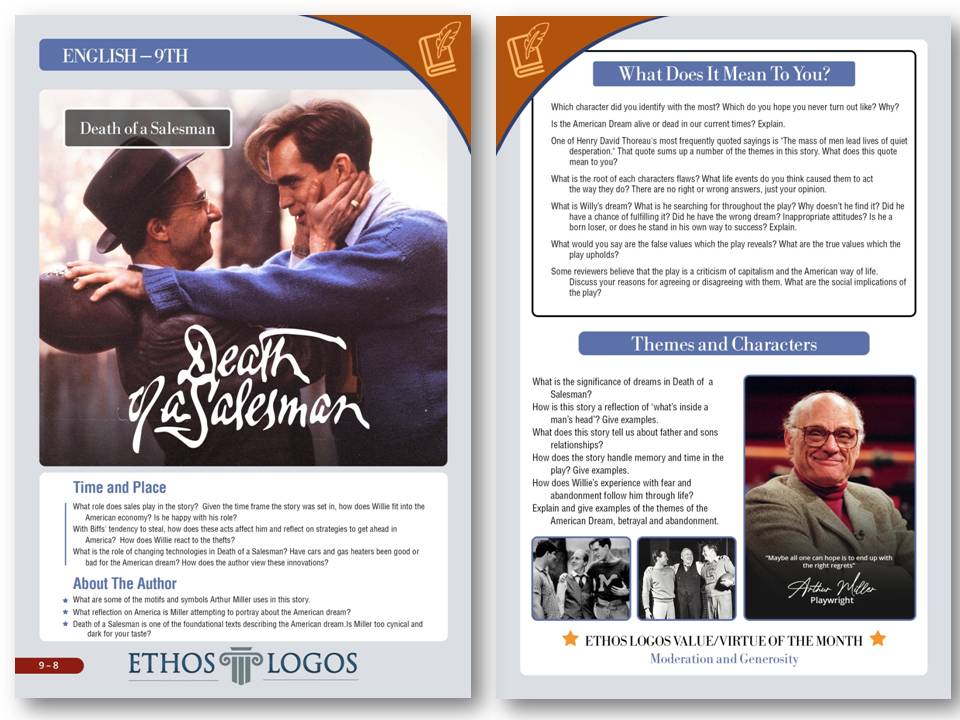
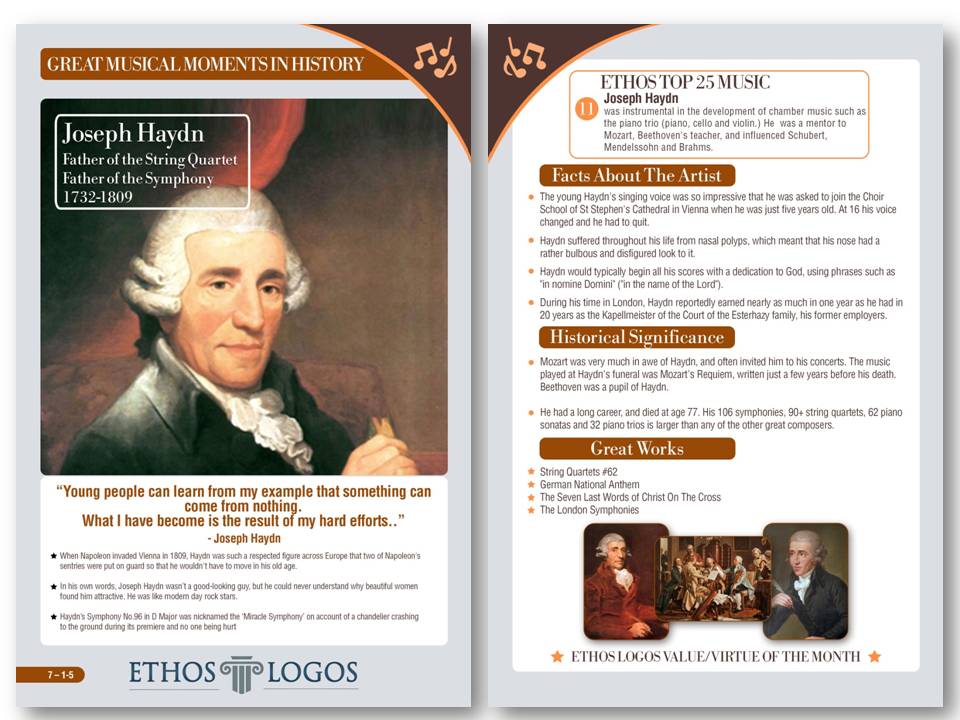

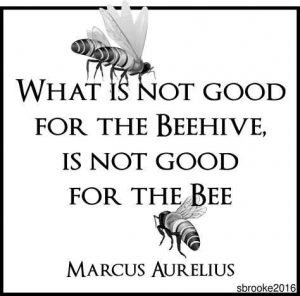

 What are the likely contenders for the power source of the future? Here are our picks for the top lithium-ion alternatives.
What are the likely contenders for the power source of the future? Here are our picks for the top lithium-ion alternatives.